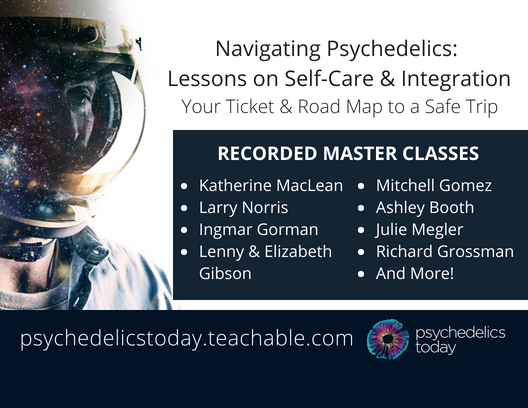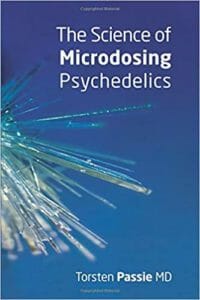In this episode, Kyle sits down to chat with Greg Kieser, Founder of think-tank, Supersystemic.ly and author of Dear Machine, a book written as a letter to a future super-intelligent entity. Topics covered include blockchain, AI, money, Psychedelic Investments and how psychedelics can help humanity prepare for the emergence of super-intelligent entities.
3 Key Points:
- Blockchain offers an enormous amount of opportunity, by taking data that would otherwise be protected by government or big corporations, and making it accessible to the general population for a more accessible information source.
- Money is this interesting concept, that we are storing our time, our energy and our goods in a piece of paper. Psychedelics can help with this, be rewiring the way we think about money and the overall exchange for goods and services.
- Psilocybin is a cure, its use does not need to be continued for it to work, so Compass Pathways is highly incentivized to continue to heal new people, which is what we want, healing at scale.
Support the show
- Patreon
- Leave us a review on iTunes
- Share us with your friends – favorite podcast, etc
- Join our Facebook group - Psychedelics Today group – Find the others and create community.
Navigating Psychedelics
Trip Journal Integration Workbook


Show Notes
About Greg
- Greg worked at a foundation in NYC aimed at reducing the rate of poverty
- He started an angel investment firm/think tank, Supersystemic.ly
- He wrote the book, Dear Machine, a letter to a future, super-intelligent entity
Looking to the Past
- Our nutrition narrowed when we became farmers
- “The truth is, we can't go back to where we came from, we have to go to a new place, so how do we do that?” - Greg
- There is such difficulty with people living in clusters (cities) and transporting all of the food in from the country
- It's important for the psyche to get back to nature and even taking on a hobby as simple as gardening can be so healing
- Children’s immune system has been shown to become stronger when living on farms and playing with animals and in the dirt
- Psychedelics are helpful in understanding how interconnected everything is
Integration of Technology
- Blockchains have the capacity to take data and pull it into a place where we have more control over it (can't be bought or sold)
- When we combine our knowledge of technology with psychedelics, we will really start to progress as a species
Block Chain
- The creator of Bitcoin created BlockChain, which is a type of database that lives out on the internet that no one can own
- It offers an enormous amount of opportunity, by taking data that would otherwise be protected by government or big corporations, and making it accessible to the general population for a more accessible information source
- Greg mentions a block chain that will be a regeneration of land
- Maybe all the members donate $50 to the block chain, and those members then can follow the progress of a pond or the growth of a tree, etc
- Its a good example of a block chain being used for good
Money
- Money is this interesting concept, that we are storing our time, our energy and our goods in a piece of paper
- Psychedelics can help with this, be rewiring the way we think about money and the overall exchange for goods and services
AI
- AI is going to get more and more powerful and corporations and governments are going to want to get their hands on AI for more power
- In Dear Machine, Greg wrote about a super aware machine that helps us to make super intelligent decisions based on what food to eat (based on our microbes, our genetics, what is the most sustainable for the environment, etc)\
- Greg fears that the government will try to take control of it and have its own agenda, but he thinks that with super awareness for decision making, that good will win
- Kyle mentions that the Western mind is so obsessed with Apocalypse
- AI and Superintelligence are going to accelerate whatever systems we already have in place
- If it happened right now, it would look ugly
- But, if we create a world that appreciates interconnectedness and the diversity and complexity of our minds and our bodies, then we will be in a much better place
- Psychedelics have a huge role to play, it allows us to appreciate things, it helps get our ego out of the way, it helps us break addiction
- Monoculturization has led to a lot of bad things
- “Don't try to change the system, just make a new system” - Buckminster Fuller
- Human well being and environmental stability are two metrics that we need to work on
Interest in Psychedelics
- Greg's interest in psychedelics began when we was invited to Psilocybin ceremonies
- He said it just ‘clicks’
- “You really don't understand what psychedelics are until you take them” - Greg
- He then began to invest in psychedelics, microbiomes, agriculture, etc
Compass Pathways
- The main problem with the health system is that we get into the idea of patenting molecules
- Psilocybin is a molecule that can't be patented, so he's not worried
- Greg wants to see psilocybin use at a larger scale, so the medical model is a great way to get there
- As a part of Compass Pathway’s program, in order to be a therapist and provide the therapy, you have to go through the therapy yourself
- Psilocybin is a cure, its use does not need to be continued for it to work, so Compass is highly incentivized to continue to heal new people, which is what we want, healing at scale
Looking Ahead
- Greg is most excited to see healing from opioid addiction
- Alcohol and tobacco fall under that in his hopes for healing
- Greg is also really excited about the microbiome and the gut connection to the rest of the body
- There was an Autism study that gave people with Autism a microbe transplant from healthy people and after 2 years there has been a remission of symptoms
Microbiome Reddit
- There was an Autism study that gave people with Autism a microbe transplant from healthy people and after 2 years there has been a remission of symptoms
Links
Supersystemic.ly
Dear Machine: A Letter to a Super-Aware/Intelligent Machine (SAIM)
About Greg Kieser

Greg Kieser is founder of Supersystemic.ly, a Brooklyn-based think-tank and angel investment firm dedicated to increasing humanity's readiness for the emergence of superintelligent entities through the study and spread of "supersystemic" perspectives and innovations. Kieser, whose university and independent studies of complex systems science form the operating thesis of the company, founded Supersystemic.ly after more than a decade overseeing a portfolio of technology initiatives at an NYC-based poverty-fighting foundation. His work at the foundation was driven by a complex set of metrics for measuring the impact of investments on the economic, physical and mental well-being of low-income New Yorkers. Dear Machine, and to a greater extent the company, unites his unique skills and knowledge in technology, social investing and complex systems science.
In this episode, Joe interviews Dr. David Nichols, American Pharmacologist and Chemist. Dr. Nichols has made many contributions to the psychedelic space and is recognized as one of the foremost experts for his outstanding efforts in medicinal chemistry of hallucinogens.
3 Key Points:
- Dr. David Nichols is the founder of The Heffter Research Institute, which promotes research of the highest scientific quality with the classic hallucinogens and psychedelics in order to contribute to a greater understanding of the mind leading to the improvement of the human condition, and to alleviate suffering.
- Dr. Nichols has a strong opposition toward the DMT/pineal gland theory. The assumption is that DMT is released during birth and death, but Dr. Nichols presents opposing arguments as to why it isn't true.
- David doesn't believe in the research of microdosing psychedelics. He believes there are many other diseases and disorders that research money could be put toward discovering drugs for than the potential for heightened creativity with microdosing.
Support the show
- Patreon
- Leave us a review on iTunes
- Share us with your friends – favorite podcast, etc
- Join our Facebook group - Psychedelics Today group – Find the others and create community.
Navigating Psychedelics
Trip Journal Integration Workbook


Show Notes
About David
- When he was a kid he was into pyrotechnics
- He synthesized a lot of MDMA for MAPS
- He is the founding President of Heffter Research Institute
- He was introduced to psychedelics before he went to graduate school
- David's work was never interrupted during the drug war because he wasn't doing any clinical work
- He proposed the study for MDMA testing on rats for a micro-dialysis of chemicals being released from the brain
David’s History of Substances
- David attended a meeting at the Esalon Institute
- He met Rick Doblin, a young kid at the time, who was enthusiastic about MDMA and Marijuana
- Rick decided he wanted to develop MDMA as a drug, and asked David to make it with him
- Then David met Rick Strassman, who asked him to make DMT
- So he made the DMT and then DMT Spirit Molecule came out as a result
- David made the first batch of psilocybin for John Hopkins
- “The only way to use these substances, is to use the medical model.” - David
Microdosing
- David doesn't agree with microdosing, he thinks its all just a big hype
- He says that there is a huge placebo effect with microdosing
- He says there isn't a lot of proven results and literature to make him believe in it
- He thinks that there are far too many other things to research and create drugs to cure (like eating disorders for example) vs. just heightening creativity with microdosing
- David edited Torsten Passie’s book, The Science of Microdosing Psychedelics
DMT
- Rick Strassman’s DMT hypothesis is that upon birth and death, the Pineal gland produces DMT, which produces an outer-body experience
- David says that the pineal gland is too small, it's only 180mg
- It produces 25 micrograms of melatonin in 24 hours, so there is no way for it to produce 25 milligrams of DMT, the amount needed for a DMT trip
Heffter Origins
- Heffter Research Institute was David’s idea
- Arthur Heffter was a scientist with a PhD in Pharmacology and Chemistry
- He was one of the most well respected Scientists in Germany
- He got samples of Peyote, and knew there were alkaloids in it, and he separated all the alkaloids, and took each alkaloid himself to find out that mescaline was the active component in Peyote
- He was the expert who invented hair tests to find out if people were suffering from lead poisoning
Heffter Research Institute
- The effects that they discovered from Psilocybin blew them away
- They knew LSD had powerful effects, but they weren't expecting to find the therapeutic benefits that they did with Psilocybin
- Psilocybin has a great timeline too, LSD is really long lasting, and 5-MEO-DMT is super short and really powerful
- Psilocybin is great for use in therapy because of the time it allows for integration
GMP Psilocybin Patent
- Joe mentions the patent of GMP Psilocybin and asks if there are other ways to make psilocybin
- David says that he believes there are other ways to make Psilocybin
- The cost of psilocybin is trivial in comparison to the cost of therapy, David doesn't think that the drug itself will have a monopoly
Links
About Dr. David Nichols
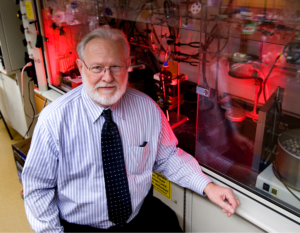
Dr. Nichols originally conceived of a privately funded Institute as the most effective mechanism for bringing research on psychedelic agents into the modern era of neuroscience. This vision led to the founding of the Heffter Research Institute in 1993. He is currently an Adjunct Professor at the University of North Carolina Chapel Hill, NC, where he continues his research. The focus of his graduate training, beginning in 1969, and of much of his research subsequent to receiving his doctorate in 1973 has been the investigation of the relationship between molecular structure and the action of psychedelic agents and other substances that modify behavioral states. His research has been continuously funded by government agencies for more three decades. He consults for the pharmaceutical industry and has served on numerous committees and government research review groups. Widely published in the scientific literature and internationally recognized for his research on centrally active drugs, he has studied all of the major classes of psychedelic agents, including LSD and other lysergic acid derivatives, psilocybin and the tryptamines, and phenethylamines related to mescaline. Among scientists, he is recognized as one of the foremost experts on the medicinal chemistry of hallucinogens. His high standards and more than four decades of research experience set the tone to ensure that rigorous methods and quality science are pursued by the Institute.
Download
In this episode, Kyle sits down with Dr. Torsten Passie, Professor of Psychiatry and Psychotherapy with the Hanover Medical School in Germany. In the show, they cover a range of topics on Dr. Passie’s studies on microdosing.
Dr. Torsten Passie will be taking part in a special panel dedicated to microdosing at Breaking Convention 2019 (August 16-18, Greenwich, London), also featuring Amanda Fielding of the Beckley Foundation, Dr David Erritzoe of Imperial College, London, Dr Devin Turhune (Goldsmiths), and Dimitris Liokaftos, exploring myriad aspects of microdosing, including its effects, unknowns, and media representation presented by BC director Nikki Wyrd. Find out more about Breaking Convention: https://www.breakingconvention.co.uk/
3 Key Points:
- Psychedelic research in the University setting died off after 2004, but is finally seeing an increase as the psychedelic revolution continues to grow.
- There is very little to no documentation of doctors doing self-experimenting with psychedelic drugs. It's becoming popular for therapists to use the substances used on their patients, more common to do the self-work before doing the work on others.
- Even if microdosing does not produce any significant effects and it is all placebo, the trend is a new way to introduce it into our society.
The Science of Microdosing Psychedelics
Support the show
- Patreon
- Leave us a review on iTunes
- Share us with your friends – favorite podcast, etc
- Join our Facebook group - Psychedelics Today group – Find the others and create community.
Navigating Psychedelics
Trip Journal Integration Workbook


Show Notes
About Dr. Passie
- Dr. Passie has been researching psychedelics for 25 years
- He specializes in the therapeutic use of psychedelic drugs
- He has found difficulties in researching psychedelics during prohibition
- Dr. Passie had a mystical experience before using psychedelics and then became interested in psychedelic use
- He had grown up as an atheist, a materialist, and his experience required him to change his psychological state
- His perception of reality was irritated and he had to see a therapist to integrate this experience
- He said that this was frustrating because he was young and still in search for his identity
- Through all of this, he decided to study medicine and become a psychedelic doctor
- He became very conscious that he was on the right track
Research Studies
- The researchers were the only ones doing studies on psychedelic states, there wasn't much happening at the Universities
- He did studies with cannabis, ketamine and even laughing gas
- The research then was on how cannabinoids can help with psychosis
- They were not successful with that, but it came to be that CBD was a neuroleptic and an anti-psychotic
- Research pretty much stopped after 2004 due to new laws and the cost of the research
- Dr. Passie does mention that in the past 10 years research has really taken off again and that we are really seeing the renaissance of psychedelic culture
- In most of the literature of doctors doing self-experimenting, there is very little to no documentation of doctors doing self-experimenting with psychedelic drugs
- Kyle mentions that MAPS has included into their training protocol to allow for therapists to have self-experiments with the substances that they are using on patients
- Kyle also mentions he can't imagine trying to hold space in breathwork without having had his own experiences with breathwork
- Dr. Passie says that the history of self-experimentation with psychedelics has shown that the participants can become ‘gurus’ and lose their objectivity, he uses Timothy Leary as an example
- But with only a few times of self-experimentation, maybe 2-4 times, he doesn't see risks
HPPD
- Hallucinogen persisting perception disorder (HPPD) is a disorder in which a person has flashbacks of visual hallucinations or distortions experienced during a previous hallucinogenic drug experience
- Dr. Passie thinks there is a selection bias in what is published about HPPD
- Its more common to have a study published that talks about an adverse effect of LSD than a benefit of it
- Hundreds of thousands of studies were conducted in the 50’s, and no one claimed that this phenomenon came up
- And now one person has conducted a study, claiming that this phenomena exists
- Dr. Passie says that this pattern happens among people who are prone to anxiety and who are dissociative
- He says that most subjects that claim to experience HPPD, have experienced visuals even before ever taking LSD
Microdosing
- It has been known to not have any effects from 15-20 micrograms of LSD
- 20-50 micrograms of LSD is considered mini-dosing, where you can feel some type of effects from it, but not as much as the full dose
- Dr. Passie says it is strange for people to claim to have increased cognition during microdosing based on conventional data that shows that LSD produces poor cognitive function
- He thinks that whatever the effects are of LSD at a high dose, that the effects at a low dose are the same, just less, not completely different effects
- He believes that there is some placebo effect with microdosing
- In terms of the microdosing trend, Dr. Passie is critical about the productivity factor, he does believe in the creativity factor though
- The flow state may also be increased with microdosing
- He claims that in his own experience with microdosing, he doesn't experience the flow state, in fact he experiences a feeling of agitation
Combinations
- In a study, when patients took a microdose first, and then a little while later, they took a different full psychedelic dose, the microdose impacted the experience of the full dose
- It lessened the effects of the full dose psychedelic
Psychedelics and Sleep
- Dr. Passie mentions a study where patients were given LSD, both high and low doses, during sleep
- What was found was that LSD impacts REM sleep patterns
- The dreams were not altered
- The REM phases got longer during the beginning of sleep, and then much shorter near the end of sleep
- It shows that the impact of sleeping patterns brings someone to feel much different the next day
The Microdosing Trend
- Microdosing has much to be explored yet
- But even if microdosing does not produce effects, the trend is a new way to introduce it into our society
- “Microdosing might be a new assimilation process of psychedelics into our culture” - Torsten
- Instead of the 60’s where we are taking huge doses, we are taking tiny doses as a slow approach to assimilate psychedelics back into society
Links
The Science of Microdosing Psychedelics
About Dr. Torsten Passie

Torsten is a professor of psychiatry and psychotherapy affiliated with Hannover Medical School, and led the Laboratory for Consciousness and Neurocognition. He has conducted clinical research on psychoactive substances and has written several books including The Pharmacology of LSD (2010) and Healing with Entactogens (2012). Between 2012 and 2015 he was visiting professor at Harvard Medical School.
In this episode, hosts Kyle and Joe sit down with Psychologist, David Luke, Executive Director of Breaking Conventions, a conference on the better understanding of psychedelics. In the episode, they cover research on psychedelics and transpersonal ecopsychology.
3 Key Points:
- Transpersonal experiences are super powerful and can be valuable if integrated properly.
- Getting access to drugs at affordable prices for research is difficult for the progression of the psychedelic movement. There is a lot of red tape in studying psychedelics.
- There is a growing field for mapping altered states of consciousness using science and research.
Support the show
- Patreon
- Leave us a review on iTunes
- Share us with your friends – favorite podcast, etc
- Join our Facebook group - Psychedelics Today group – Find the others and create community.
Navigating Psychedelics
Trip Journal Integration Workbook


Show Notes
About David
- David is a Psychologist
- He works at the University of Greenwich
- He is a co-founder of the Breaking Convention Conference
Breaking Convention
- August 16-19, 2019 in London England
- There are over 180 speakers, a variety of workshops, and more
- David will be speaking about Shamanic perspectives and mapping altered states of consciousness
- The topic of David’s speech for the conference is Ecodelia: Towards A Transpersonal Ecopsychology Through Psychedelics.
Parapsychology
- Parapsychology is a study of phenomena that questions what we think we know about science
- David has conducted pre-cognition experiments with ayahuasca, san pedro, mescaline
Research
- David says it's tricky doing this work because there is a serious amount of red tape around psychedelic studies
- Getting access to the drugs and to get a lab to make them specifically for research is outrageously expensive
- David says that Compass Pathways is making the research side of things easier
- He says that he wants the proper research to be done so that it can be available for all those who need it, and for that he supports Compass Pathways, but if they were to pull something like what happened with Esketamine and making an isomer of Ketamine extremely expensive, then he will not support it
Nature and Psychedelics
- Psychedelics provide a feeling of connectedness with nature
- People prefer to take psychedelics outside, but overall prefer to have amazing, transformative experiences, which in turn makes them more tuned in to nature
Transpersonal Experience
- An experience that is genuinely transpersonal can be useful
- Typically after a transformational experience, people question their sanity, they have cognitive dissonance, their world view just isn't suitable enough to contain a normal sense of reality anymore
- Its common for a lot of experiences to need a lot of integration afterward
- David leads breathwork sessions
- He sees people who have taken loads of psychedelics come in with skepticism about Breathwork, and then leave having the most transformative experience they've ever have
- “There are no limits to the human mind, and there are many ways to get there, and psychedelics are just the more obvious route.” - David
- We get further and further away from figuring out psychedelics as a whole the more hyper-specialized we become in our individual fields
- The psychedelic space is a really interesting territory
- The things that Terrence McKenna would talk about years ago, we are finally starting to explore with science
Links
Otherworlds: Psychedelics and Exceptional Human Experience (Muswell Hill Press)
About David
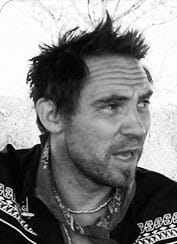
David is Senior Lecturer in Psychology at the University of Greenwich where he teaches the Psychology of Exceptional Human Experience. He was President of the Parapsychological Association between 2009-2011 and has published more than 100 academic papers on the intersection of transpersonal experiences, anomalous phenomena and altered states of consciousness. He has co-authored/co-edited four books on psychedelics and paranormal experience, directs the Ecology, Cosmos and Consciousness salon at the institute of Ecotechnics, and co-founded Breaking Convention.
In this episode, Kyle interviews David Krantz, Certified Epigenetic Coach, and an expert in nutritional genomics. In the show, they talk about the effects of substances via the implications on an individual’s genetics.
3 Key Points:
- Epigenetic testing is a bio-hack for boosting cognitive function and harnessing our creativity and ultimate human potential.
- There has been a lot of research done on genetics and the effects of THC. The body produces cannabinoids that activate the THC receptors internally, which varies from person to person.
- Each person should be seen on an individual level, and the more we know about our unique genetics, the more we can understand about our interactions with different substances.
Support the show
- Patreon
- Leave us a review on iTunes
- Share us with your friends – favorite podcast, etc
- Join our Facebook group - Psychedelics Today group – Find the others and create community.
Navigating Psychedelics
Trip Journal Integration Workbook


Show Notes
About David
- David works with clients on creating optimal epigenetic expression
- He uses people’s genetics as a guide to look at recommendations for diet, herbs, supplements, etc.
- He began looking at cannabis for recommendations and found curiosity in psychedelics too
- Epigenetics studies the effects of the modification of genetics
- It looks at chemical groups attached to the DNA itself and what happens to them over time
Cannabis and Genetics
- The most robust area of research on genetics is THC
- David said he has seen some research on Psilocybin and just very recently that liver enzymes are responsible for LSD interactions
- It looks at the way people are metabolizing these substances
- When you ingest something or smoke it, it has a higher impact on the body, edibles are a great example
- Kyle brings up the curiosity of edibles impact being either physiological or biological
- Genetics show the body’s cannabinoid levels
- The body produces cannabinoids that activate the THC receptors internally
- There are two enzymes that break down cannabinoids in the body, Anandamide and 2AG
- There is a higher likelihood to use cannabis in a person with lower levels of endocannabinoids
- This makes some people high-functioning stoners, and others non-functioning stoners
- The substance is neutral, it's all about the body and how it reacts to it
- When the liver breaks down an edible, it makes THC more potent
- There is speculation that the slow metabolizers have a better chance of passing a drug test because they don't have a chance to convert 110HTHC to the COOHTHC
Food and Substance Effects
- Kyle mentions someone who was drinking grapefruit juice everyday for 3 weeks, and it potentiated the effects of Ketamine
- In order to psilocybin to be converted to psilocin, you need a chemical in your body called alkaline phosphatase
- Vitamin C deficiency and Vitamin B-6 deficiency all both correlated with alkaline phosphatase deficiency
- David brings up his experience going keto, it worked really great for him, his energy levels increased, he lost weight, but his wife had a horrible time with keto
- Then he looked to genetics and it made perfect sense to him as to why it worked for him and why it failed for her
- Metabolism, biochemistry, genetics, and so many other factors impact a person's reaction to substances
Gene Type Testing
- Apeiron
- David also mentions that with companies like 23 and me, they get their money from selling people’s genetic information
- He says Apeiron is focused on what you can actually do with the information, not just simply providing the results
- David says its super valuable for people to know these things about themselves, how to mitigate stress, how the metabolism works, knowing what to eat, knowing vitamin deficiencies, etc.
Psychedelics in the Future of Epigenetics
- David thinks were going to see that the epigenetics of psychedelics are going to show the ability to overcome trauma
- When we look at people at an individual level, we all have our own idiosyncrasies and variations
- “Because there is no such thing as an average human, let’s stop treating people like average humans and start treating them like they are individual people. Let’s stop leaving out the outliers.” - David
- Taking an individualized approach to the psychedelic space is highly beneficial
Links
About David
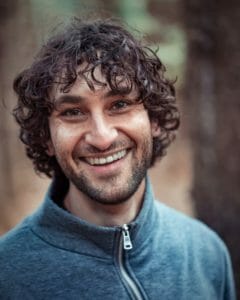
David Krantz is a certified Epigenetic Coach who specializes in boosting cognitive function and helping clients harness their creative and personal power. As a lifelong musician, David sees the various systems of the body as parts of a complex symphony. And, as a coach, he excels at fine-tuning those parts to create resonant harmonious health. David also serves as Director of Psychoacoustics at Apeiron Center in Asheville, NC where he develops sound-based tools for better mood, energy, and focus. Additionally, he’s an expert in the pharmacogenetics of the endocannabinoid system and has developed a proprietary genetic test for looking at individual response to cannabinoids. A biohacker by training and artist by nature, David enjoys working with others who have a deep passion for enjoying life.
Download
In this episode, Kyle joins in conversation with Dr. Sam Gandy. During the show, they cover topics including the implications psychedelics have for human well-being and the biosphere at large at a time of growing disconnection.
3 Key Points:
- There have been a lot of recent threats to our planet and its survival if we continue on our current path of unsustainability. Feeling connected to nature increases the human desire to take care of and heal nature.
- There has been an inverse correlation with our connectedness to nature and our connection with technology. Getting out in nature, as well as using psychedelics in nature, both help increase our connectedness to nature.
- There has been a rise in cutting edge research that reveals the capacity of psychedelic substances to enhance human-nature connection, which Sam shares snippets of throughout the episode.
Support the show
- Patreon
- Leave us a review on iTunes
- Share us with your friends – favorite podcast, etc
- Join our Facebook group - Psychedelics Today group – Find the others and create community.
Navigating Psychedelics
Trip Journal Integration Workbook


Show Notes
About Sam
- Sam has a PhD in Ecological Science from the University of Aberdeen and a Masters in Entomology from Imperial College London
- He has a lifelong interest in nature and wildlife and has conducted research in areas all over the world
- He is a Scientific Assistant to the Director at the Beckley Foundation
- He is a collaborator with the Psychedelic Research Group at the Imperial College of London
- Sam’s interest in psychedelics began in London when it was legal to buy mushrooms
- He was ‘anti-drug’ until he discovered psychedelics and began to explore consciousness and a love for nature
- His background in Ecology (the science of interconnection) has combined with the Psychedelic field
- Sam is interested in the capacity of psychedelics to increase human-nature connection and relatedness
Saving Earth
- There is a huge threat that our planet won't survive past this century if we continue on our path of destruction
- Remedying our nature disconnect is something really important if we want to survive
- This nature disconnection is inversely proportional from our technological connection
- We cant live without nature
- We have to make room for all the other life going on, not just the life that directly serves humans, like crops and livestock
- There is an increasing awareness of the need for nature connection
- Sam mentions about humanity’s screen addiction, it raises our cortisol levels and there are many consequences such as psychological and physiological effects
- “Contentment is the enemy of invention”
- Psychedelics and the internet are growing alongside each other
-
- Timothy Leary would say the internet is the psychedelics of the future in terms of connection
- The internet is playing a pivotal role in access to information in this psychedelic renaissance
- “Technology is not good or bad, it's about how its used, the intent behind it” - Sam
Nature Disconnect
- Sam thinks that the first step that took us away from nature is when we started farming, we became less hunter-gatherer minded and stepped away from the wild environment
- At that point we started living in large groups (creating cities)
- Then there was the division of labor and urbanization
- Cities and technology are the main reasons for our disconnect with nature
- “Long term sustainability would be one of the chief governing principles of how things are ran” - Sam
Psychedelics and Nature
- There is something radical about psychedelics, they can convert the skeptics into appreciating nature
- The ego dissolution character of psychedelics are a key component in feeling connected to nature
- The default mode network (where the ego resides) becomes relaxed and dissolved, and when that happens there is a breakdown of perceived boundaries between self and others/nature
- That dissolution of boundaries is a key component in the psychedelic experience
- “When you feel part of it, it changes fundamentally how you relate to it” - Sam
- One's knowledge of nature is a very weak predictor of one's concern for nature
- There isn't research of the use of psychedelics in natural settings yet, Sam hopes that as we research psychedelics more (in clinical settings) the research can evolve into studying their use in nature
- With psilocybin, most people have claimed to have a long-term fleeting change in their connectedness to nature, that the feeling of connection doesn't go away after the trip is over, it lasts for weeks, months, even the rest of their life
Rigid Egos and Nature Disconnection
- Psilocybin decreases blood flow to the default mode network
- "When we are destroying our own homes (our bodies and nature) are we falling out of love with our self?" - Kyle
- When we dissolve the ego, we increase connection, to ourselves, to others and to nature
Future in Psychedelics
- We are going to see the rise of Psychedelic Therapy
- We are going to see Psychedelic groups and communities on the rise
- From those groups, we will see projects and initiatives develop, which could bring decriminalization, integration circles, etc.
- Sam believes the rise of depression and anxiety are a cause of our disconnection to nature, and he believes there is a lot of personal healing to be had if we get back into nature and actually play a role in healing nature too
- Instead of trying to save the world just for our children and our children's children, we need to look at this planet as if we were to reincarnate and come back to this planet, so we should want to look after this physical plane to make it better for future installments of ourselves
Get Connected with Nature
- The direct, physical sensory experience with nature alone is well known to increase our connectedness with it
- Sam suggest listeners to get out in nature and do anything! Boating, gardening, bee keeping, a walk in the woods, whatever
- Sam really likes the art of Japanese Forest Bathing, which is about mindfulness and taking in nature, maybe combining it with breathwork exercises, etc.
- The more mindful you feel, the more connected to nature you are, and vice versa
Final Thoughts
- Nature connection is just a single facet of the psychedelic experience, and Sam hopes for more research on this facet in the future
- We have a decent amount of research on psychedelics effect on people with depression, PTSD, etc, but Sam hints toward some future research on the effects of psychedelics on the healthy-normal population
- Make time for nature in whatever way works for you
- 2 hours of nature time a week are profoundly beneficial for health
Links
Email: greensam2512@hotmail.com
About Dr. Sam Gandy
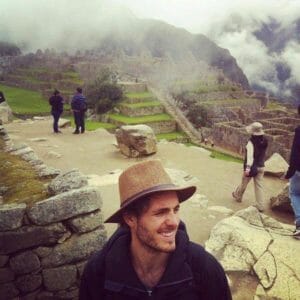
Dr. Sam Gandy works on the cutting edge of psychedelic research, as Scientific Assistant to the Director of the Beckley Foundation, and as a collaborator with the Psychedelic Research Group at Imperial College London. Sam has a lifelong love of nature and wildlife, and a PhD in ecological science from the University of Aberdeen. He has been fortunate enough to conduct field research in various parts of the world including the UK, Kefalonia, Almeria, Texas, the Peruvian Amazon, Vietnam and Ethiopia. Outside his work in the psychedelic field he has written papers, book chapters, articles and spoken at conferences and festivals on psychedelics and he is fascinated by their potential to benefit human lives.
Download
In this episode, Joe and Kyle sit down and chat with Veronica Hernandez and Larry Norris of Decriminalize Nature Oakland. Decriminalize Nature is an educational campaign to inform Oakland residents about the value of entheogenic plants and fungi and propose a resolution to decriminalize our relationship to nature, which just recently had success in doing so.
3 Key Points:
- Decriminalize Nature Oakland is a campaign that just recently found success in decriminalizing psilocybin mushrooms as well as other psychedelic compounds naturally derived from plants or fungi, such as ayahuasca, peyote and DMT.
- The mission behind Decriminalize Nature is to improve human health and well-being by decriminalizing and expanding access to entheogenic plants and fungi through political and community organizing, education and advocacy.
- These decriminalization initiatives are gaining traction across many cities in the US. It's about connecting to key people in the community and educating them, so they can use their reach to get information about these plants out there, to provide access to people everywhere.
Support the show
- Patreon
- Leave us a review on iTunes
- Share us with your friends – favorite podcast, etc
- Join our Facebook group - Psychedelics Today group – Find the others and create community.
Navigating Psychedelics
Trip Journal Integration Workbook


Show Notes
About Veronica
- Veronica is a clinical psychologist licensed in Peru
- She has been working in the US as a Social Worker Clinician
- She has been combining plant medicines and spirituality back into psychology
- She is currently finishing her PhD at CIIS
About Larry
- He is in the same PhD program as Veronica
- Him and Veronica are the team that created ERIE
- In between they have taken the time to run Decriminalize Nature Oakland
Decriminalize Nature
- In this initiative, they had to convince 8 people of city council to agree to this, in comparison to the Denver Initiative, where they needed thousands of ballot signatures
- This bill included naturally occurring psychedelic compounds, not just mushrooms
- Larry mentions they used the word entheogen instead of psychedelic, as a way to create new conversation around the plant medicines a reduce the stigma
A Win for Plant Medicine
- From where Veronica comes from, Ayahuasca and other plant medicines are national patrimony, state and church can't touch them
- To be able to bring these to a place where it's considered schedule 1, Veronica is super inspired about being able to make this happen
- Right now these plants are in a tug of war between money interest of the tax side and the government, and the other side of corporate interest
- The goal now is to educate people on what these plants do, safe practices and develop places and services to hold the space and make these plants available to people
- It's about connecting to key people in the community and educating them, so they can use their reach to get information about these plants out there
- Starting city by city is typically easier to initiate, to then have a better hold on direct action and education afterward to be able to duplicate on the state level
- They have had 50 different cities from 30 different states reach out to make this happen in their communities
- Veronica says that her first time trying San Pedro, she had felt an immediate connection to the plants
- It became her goal to combine conventional medicine with plant medicines and make it available to everyone
- “To be in touch with something bigger than yourself is one of the most important things" - Veronica
Sustainability
- Although there was no verbiage in the bill, they are being mindful about sustainability of the plants when making them more available with decriminalization
- Synthesis is a better idea for ibogaine, 5-MEO-DMT and other compounds that are naturally derived but also pose a risk to their sustainability with decriminalization
- The landscape just doesn't allow for synthesis right now, so we start at decriminalization and then hopefully open doors to the route of synthesis to aid in the sustainability of these substances and resources
- Larry’s advice is that instead of spending your money and taking a trip to Denver or Oakland, to stay home and organize this is your own community because it can actually happen
-
- It starts now and it starts with education
Joe says the most major push-back received in Denver for the decriminalization was the threat of people driving on mushrooms
- It starts now and it starts with education
Links
About Veronica

Veronica Hernandez, is a clinical psychologist and shamanic practitioner from Peru. Since 2006 she has been trained on shamanic facilitation. She received her clinical training at the Institute of Rational-Emotive Therapy, New York, under the supervision of Dr. Albert Ellis. She was assistant professor at the Universidad Peruana Cayetano Heredia and research assistant at the Hospital Psiquiátrico Noguchi de Lima (Peru). In the United States, she worked as a Social Services Clinician at John Muir Health Hospital’s Inpatient Psychiatric Adolescent Unit, California. Currently she is completing her doctoral degree at California Institute of Integral Studies (CIIS), San Francisco, where she is carrying out research on the healing and transformative benefits of entheogens, especially Ayahuasca.
About Larry
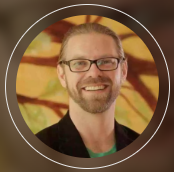
Larry Norris, MA, PhD Candidate is the co-founder and executive director of ERIE (Entheogenic Research, Integration, and Education) 501(c)(3), a group dedicated to the development of entheogenic research and integration models. Larry is also a co-founder and on the Board of Decriminalize Nature Oakland and helped to co-author the resolution which received an unanimous decision from Oakland City Council. Beginning his studies in cognitive science as an undergrad at the University of Michigan, he is now a PhD candidate in the East-West Psychology department at the California Institute of Integral Studies (CIIS) in San Francisco. His dissertation reviews archived ayahuasca experiences to identify transformational archetypes that induce insights hidden within the experiences. As adjunct faculty at CIIS, Larry taught a graduate course called Entheogenic Education: Contemporary Perspectives on Ancient Plant Wisdom in order to discuss the concept of entheogens as educational teachers and cognitive tools. He was also an adjunct faculty at John F. Kennedy University teaching a class titled Paradigms of Consciousness. A dedicated activist and proponent of cognitive liberty, Larry’s efforts are a contribution to not only change the Western legal status of these powerful plants, fungus, and compounds, but also to emphasize the potential sacred nature of entheogens given the right set and setting.
Download
In this episode, Kyle talks with Tom Lane, author of Sacred Mushroom Rituals: The Search for the Blood of Quetzalcoatl. In the episode, they discuss the history of Quetzalcoatl, the ceremony of the deified heart and sacred mushroom rituals.
3 Key Points:
- Quetzalcoatl is a feathered-serpent deity of ancient Mesoamerican culture that can come to you when partaking in the ceremony of the deified heart. Quetzalcoatl teaches how to overcome fear and hatred and bring love.
- The ceremony of the deified heart is a sacred mushroom ritual that when methods are combined correctly, can bring about Quetzalcoatl.
- In the episode, Tom tells intriguing stories of his experiences with mushroom rituals and experiencing Quetzalcoatl, including a ceremony with Maria Sabina.
Support the show
- Patreon
- Leave us a review on iTunes
- Share us with your friends – favorite podcast, etc
- Join our Facebook group - Psychedelics Today group – Find the others and create community.
Navigating Psychedelics
Trip Journal Integration Workbook


Show Notes
Quetzalcoatl
- He was not an Aztec, he originated as a King in the Toltec civilization thousands of years before the Aztecs
- As legend has it, where his blood fell is where the sacred mushrooms grew
- Some people believe he was a Naga, a combination flow of energy, a male/female serpent
- A winged, jeweled, male/female, serpent
- In the ceremony of the deified heart, the serpent will come to you
About Tom
- He was building geodesic domes in a remote area in Mexico
- He had some of his first mushroom experiences, and it led him to realize that the story of mushrooms was about Quetzalcoatl
- His first experience with the mushroom was mild
- He said the mushrooms found him, he takes them as a sacrament
Ceremony of the Deified Heart
- The legend was that Quetzalcoatl gave cacao to participants as an aphrodisiac and it would help release serotonin
- The goal is not to talk a lot
- Then, the mushrooms are to be retrieved from the ground, fresh
- Before the ceremony, Tom says he likes to put four candles placed in all four directions
- The key to eating the mushrooms is eating them totally covered with honey
- You eat them two at a time, as it represents the male and female
- And when you eat the mushrooms, you actually never swallow
- You chew and chew and the mucous membranes of your tongue take the psilocin straight to the brain and spine
- He says once it starts to take effect, it feels like there is a snake up your spine (He mentions his friends call this Kundalini)
- Then you go out and Quetzalcoatl will come
- When he comes, he is like a rainbow jeweled serpent, an embodiment of pure light, pure energy, pure love
- Tom says the next day it feels like you're 10 years younger
- Its a pure force of love, an obliteration of the concept of time
- Quetzalcoatl created this ceremony to bring about the serpent for healing, for a balance of male and female
- This ceremony is best done during the night, with thunderstorms in the mountains
Ceremony with Maria Sabina
- One night they went to see Maria Sabina
- She agreed to do a ceremony at night
- Her house was in the mountains and had a thatched roof with no windows or doors and sometimes clouds would come through her house
- During a ceremony a lightning bolt came though the house, in one window and out the other
- Maria’s daughter gave him truffle like mushrooms and he brought them back with him
- Maria’s daughter really tried to learn his name, she repeated it a multitude of times until she said it exactly perfectly so she could say it during the ceremony
Quetzalcoatl Messages
- God gave us love and pain
- We have to learn how to celebrate the pain
- God gave us knowledge, and tools of how to heal the pain
- Tom’s goal is to teach people how to take the sacred mushrooms to meet Quetzalcoatl and find healing, love and peace
- “Once you get rid of the ego, you get rid of fear, and then you have love.” - Tom
- The only way you can overcome hatred and fear is with love
- The body is teaching the mind when consuming the sacred mushroom
- It's best to just try to love people and be kind, and it's all acts of kindness and love that makes a person feel good
Links
Sacred Mushroom Rituals: The Search for the Blood of Quetzalcoatl
About Tom Lane
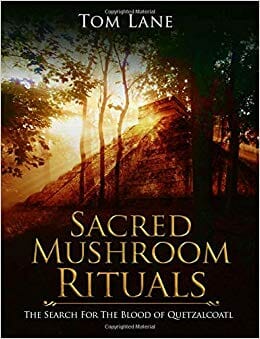
Tom, Author, has a Bachelors in Forestry from the University of Tennessee and a Masters from the University of Florida in Science Education and Middle School Education. He has worked full time in the Solar Energy field as a Contractor and Trainer and has a background in Mushrooms. Tom spent some time in 1973 living in the jungles of Palenque in Mexico and learn about mushrooms and mushroom ceremony. Tom is the Author of the book, Sacred Mushroom Rituals, The Search for the Blood of Quetzalcoatl.
Download
In this episode, Kyle interviews Dr. Alexander Belser, a Clinical Researcher who has done a variety of works in the psychotherapy and psychedelic fields, helping patients heal from depression, OCD, suicide, and other illnesses, all while focusing on gender neutrality and equality. In this episode, they cover topics on privilege, inclusivity and recommendations for the psychedelic space.
3 Key Points:
- Privilege is commonly seen in therapist roles and as well in an individual’s access to treatment. It's important for the psychedelic community to be vocal about privilege and be inclusive of all types of people, all repressed groups.
- Psychedelics have the power to help people come to terms with their own sexuality, as well as become accepting of other individuals sexual identification.
- In order to see more equality in the psychedelic space, we need to confront structural heterosexism and transfobia, retire the male/female therapy diad, and develop acknowledgement in the psychedelic world of the stresses that LGBTQ people face.
Support the show
- Patreon
- Leave us a review on iTunes
- Share us with your friends – favorite podcast, etc
- Join our Facebook group - Psychedelics Today group – Find the others and create community.
Navigating Psychedelics
Trip Journal Integration Workbook


Show Notes
About Alexander
- Alexander started attending psychedelic conferences in college
- He works at Yale currently, treating individuals with major depressive disorders with psilocybin assisted psychotherapy
- He lives in New York and works on a team for the MAPS, MDMA trial for the treatment of PTSD
Queering Psychedelics
- Queering Psychedelics is a Conference put on with the help of Chacruna
- Its an opportunity for Queer folk to come together and talk about psychedelic medicine
- Alexander's presentation was on Queer Critique for the Psychedelic Mystical Experience
Privilege and Inclusivity
- People with more privilege have more power, more access to funding, more access to expanding the research agenda
- Many of the people in psychedelic research are privileged, white, cisgender individuals (and Alexander believes they are using the privilege for good)
- But it's important for the psychedelic community to be vocal about privilege and be inclusive of all types of people, all repressed groups
- Alexander thinks that we need to eliminate the male/female diad
- The typical structure for psychedelic therapy is to have a male cisgender therapist and a female cisgender therapist
- But Alexander thinks this is gender essentializing
- Its totalizing of gender, assuming that the masculinity is held by the male therapist, and femininity is held by the female therapist
- Alexander thinks that the therapists should be more gender neutral
- Its essential to assess the individual needs of the client for specific gender pairing
Recommendations
- Alexander's Reccomendations
- Confront Structural Heterosexism and Transfobia
- Retire the Male/Female Therapy Diad
- Acknowledgement in the Psychedelic world of the stress that LGBTQ people face
- We need to be able to run moderation analyses to see if a type of psychedelic treatment works the same for sexual minority populations as it does for straight folks
- Are there unique clinical considerations for sexual minorities?
- The psychedelic Renaissance is maturing and reaching a point where our approaches can be more inclusive
- He thinks it's important for straight folks to think about this too
- “We all suffer, including straight folks, in a world where the idea of gender and sexuality is firmly printed as either being A or B. It's a disservice to our identities.” - Alexander
- It is common to feel “oneness” after a psychedelic experience, and it's common for gender roles to change throughout the process
- And on the flip side, maybe our perception of other people’s gender (homophobia) transforms from a psychedelic experience, and we can become more accepting of other forms of gender
Mystical Experience
- When people score higher on the mystical experience questionnaire (profound unity, transcendence of time and space) its predictive of their improvements on depression and anxiety
- It's important to be mindful of what value we put on marginalized people’s psychedelic experiences
- The most common issue Alexander sees is people feeling ‘stuck’ in these bodies
Psychedelic medicine encourages (at least in appeal) embodiment
Final Thoughts
- First, we need to come to terms with our own internalized homophobia, transphobia and racism
- Together, we learn from each other, how to dismantle types of patriarchal, homophibic and transphobic structures
- MDMA expanded access may probably end up being very expensive, we need to think about privilege and access to mental healthcare broadly
- It's not just about diversity, Alexander encourages people to create allies
- He has hope that we can proceed with integrity in these topics
Links
Alexander's website
Center for Breakthroughs
About Dr. Alexander Belser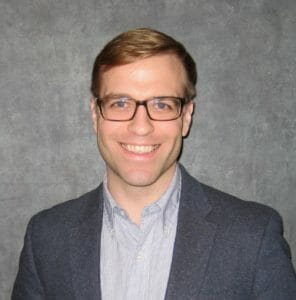
Alexander Belser, Ph.D., is a Clinical Research Fellow and clinical supervisor at Yale University. He is the Co-Investigator of two studies at Yale exploring psychedelic-assisted psychotherapy to treat OCD and depression. His research with sexual minority people has focused on preventing suicide among adolescents and on the protective role of gay-straight alliances for students. Dr. Belser was a founding member of the Psychedelic Research Group at NYU in 2006, and he is currently an Adjunct Faculty member in NYU’s graduate program in Counseling Psychology. He has been a researcher on various psychedelic studies of depression, anxiety, OCD, addiction, trauma, and among religious leaders. He is a study therapist for the MAPS study of MDMA-assisted psychotherapy for PTSD. Dr. Belser serves as a peer reviewer and has published peer-reviewed articles on topics such as psychedelic mysticism, altruism, patient experiences in psilocybin-assisted psychotherapy, cancer and psychedelic therapy, case studies, psilocybin treatment and posttraumatic growth (forthcoming).
In this episode, Kyle interviews Dr. Ido Cohen, co-founder of The Integration Circle. In the show they talk about themes that arise from transformative experiences and the different ways to integrate them through attitude change, environment and community.
3 Key Points:
- A common theme after a transformative experience is the calling for an attitude change. The experience is only the first step, the integration is where the real work begins.
- Environment is a critical part in integration. You can't always change your environment, but you can change your relationship to it by forming new coping mechanisms than the ones used before a transformative experience.
- Joining consciousness events, finding a therapist and looking for integration circles are all great way to not feel so ashamed or alone after a transformative experience.
Support the show
- Patreon
- Leave us a review on iTunes
- Share us with your friends – favorite podcast, etc
- Join our Facebook group - Psychedelics Today group – Find the others and create community.
Navigating Psychedelics
Trip Journal Integration Workbook


Show Notes
About Ido
- Ido is a Clinical Psychologist based in San Francisco
- He works with individuals and couples in integration groups
- Ido graduated from the California Institute of Integral Studies (CIIS)
- He did his post-doctoral internship at C.G. Jung Institute in San Francisco
- He went to India and it opened up the psycho-spiritual realm for him
- He realized there is a lot more to this reality than what we see
- He had a powerful Ayahuasca experience, and it led him to choose his dissertation project
-
- He wanted to know how to take his experience and integrate it into his daily life
Integration
- Ido began talking to people who had big transformative Ayahuasca experiences (pre, during and after)
- He interviewed people at a year out of an Ayahuasca experience, so they had time to reflect
- “For most people, something is calling them. Either curiosity or suffering.” - Ido
- The message comes through a relationship that we are having with something
- People felt that they had to go through something personal before they were able to go into archetypal realms
- A theme afterward was difficulty of re-entry (integration)
- Another common theme was people realizing that they need to change their attitude in order to heal
- It starts with small steps, maybe instead of watching TV for 2 hours you go for a hike for 2 hours, you open up to make room for change
Ego and Self
- Jung’s idea of ego-self access; there is the ego that takes things and organizes them and processes things into our reality, and then the self that is the unconscious, the imaginary and dream state
- The idea is to look at the relationship between the two
- Are they fighting or are they in harmony?
- The role of community is so important
- “We need to learn to integrate not just the negatives, but also the positives.” - Ido
- Having pleasurable experiences can feel unsafe to a person who has been through a lifetime of negatives
Transformative Experiences
- Personal and Environmental
- Most people have these experiences, and come back to the same urban environment, the same work mindset, the same cultural ideals about “achieving”, the instant coffee mentality
- “We want things fast because we don't want to suffer, we don't want to wait, we don't want to invest, we don't want to change.” - Ido
- “When people come back with this new experience but to an old environment, then the question is, ‘How can I not let the pressure of this old environment get in the way of my experience?’” - Ido
- It really is all about changing your attitude
- Maybe go journaling, go into nature, go dancing, etc.
- “How do I honor my process and not succumb to the pressures of using the same coping mechanisms as I had before?” - Ido
- Integration is a complex process
Environment
- You can't always change your environment, but you can change your relationship to your environment
- You can start looking for integration circles
- You can start looking for therapy
- You can go to consciousness events, meditation/yoga groups
- It really depends on the person but it's all about finding resources that help you feel more connected, less ashamed, and less alone
- One of Ido’s clients said to him “I realize I have to break my own heart if I really want to change”
Spiritual Bypass
- Ido suggests a great book on understanding spiritual bypass
- Spiritual Bypassing: When Spirituality Disconnects Us from What Really Matters
- When you start to be really critical about an experience, that's where you need to be more curious
- Shift from criticism to curiosity
- Jung says that this is ‘the lifelong process where we are slowly descending into our authenticity’
Final Thoughts
- Seek community
- Don't do it alone, even if you think you can, you don't have to
- If you're shy, come anyway, were all just doing our best
- Encourage people to seek out knowledgeable communities
- Take yourself seriously, honor these sacred experiences and honor yourself
Links
About Ido Cohen
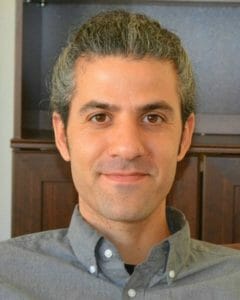
Ido offers depth oriented psychotherapy to the bay area out of San Francisco. Ido conducted his doctoral dissertation study for 6 years, researching the integration process of Ayahuasca ceremonies in western individuals, using a Jungian psychology lens. Ido is committed and passionate about supporting individuals engaging in psychedelic, entheogenic and other consciousness expanding practices, as they integrate their experiences to create long lasting and sustainable change. In addition to his psychotherapy practice, he offers individual and group preparation and integration services.
Download
In this episode, Joe interviews Raquel Bennett, Psy.D. at Kriya Institute. In the show, they cover topics surrounding the properties and paradigms of therapeutic Ketamine use.
3 Key Points:
- The Kriya Institute is devoted to understanding the therapeutic properties of Ketamine. Raquel Bennett specializes in using Ketamine therapy for patients with severe treatment resistant disorders.
- There are three questions that should be used when determining if someone is fit for Ketamine therapy. Is it safe? Is it legal? Is it ethical?
- There are many different paradigms for Ketamine Therapy, but determining the best method for each individual patient is the goal.
Support the show
- Patreon
- Leave us a review on iTunes
- Share us with your friends – favorite podcast, etc
- Join our Facebook group - Psychedelics Today group – Find the others and create community.
Navigating Psychedelics
Trip Journal Integration Workbook


Show Notes
Kriya Institute
- The Kriya Institute deals with how to work with Ketamine specifically in Psychiatry and Psychotherapy
- Kriya provides clinical services to patients, training for other clinicians, and Kriya conference
- The conference is a big collaborative meeting
- Raquel is trying to create a patient assistance fund to make services more available to people
Ketamine
Ketamine isn't addictive physically
It is possible to become psychologically addicted to Ketamine
Raquel thinks its a property of the person not of the object
It's possible to become addicted to anything, shopping, sex, etc.
About Raquel
- She first encountered Ketamine in 2002 when she was suffering from severe depression
- She was seeing a therapist that took her to a psychedelic shaman where she took Ketamine
- From the way she felt after taking Ketamine, she wanted to know if it was replicable for other people
- She is interested in people with treatment resistant mood disorders, such as severe depression, unusual bipolar disorder and people living with active suicidal ideation
- She remembers her teachers (who gave her Ketamine) saying they don't use it often, and don't know if it will work
- They were not seeking an antidepressant effect, they were helping her to connect to the cosmos and the universe, to find out why she was having such severe depression
- The fact that it acted as a rapid-acting antidepressant was a surprise to them, and that's what triggered her curiosity with it
- “Most of what I know of being a Ketamine provider, I learned from being a patient” - Raquel
Ketamine and Patents
- Johnson and Johnson just came out with a filtered Ketamine product that they patented
- $850 for 84mg of filtered Ketamine
- $1.59 for 100mg of generic Ketamine
- They are only providing it as a nasal spray
- Companies tried to make a new molecule, but they couldn't
- Instead, they modified it, and filtered it, and then patented it (Esketamine)
Ketamine Treatment Paradigms
- There is a lot of disagreement on the route, the dose, the setting importance, etc
- This was the reason she created the Kriya conference, to share ideas, to find the best possible methods
- One way is to give it as a low dose infusion out of the anesthesiology model (0.5mg of Ketamine per kg of bodyweight in an infusion center)
- They aim to get enough ketamine in the patient's body without the psychedelic effects
- They take the normal dose, divide it by 6, and space it out to avoid the psychedelic nature
- The patient is being forced into a passive role, they aren't being called to heal themselves, they are just showing up for the medicine
- Raquel says that's not all that there is to it, the medicine is only half of it
- Another paradigm for using Ketamine is facilitated Ketamine Psychotherapy
- In this way, the Ketamine is used as a lubricant for talk therapy
- We are using Ketamine to help people to talk about material that is too painful or too shameful to get to otherwise” - Raquel
- In this paradigm, the emphasis is on the therapy, not the Ketamine, the Ketamine is a lubricant and a tool
- In this way, the patient and the therapist are both participating 50%, the patient is not passive
- She says the psychedelic effects are to be avoided, or else the patient becomes too far out
- The third paradigm would be to induce mystical experience on purpose
- As a provider, it is believed that the visions are meaningful
- Only about 1 in 6 patients are actually a good candidate for psychedelic dosing
- The patient is willing to offer their body up as a vessel, and the messages they receive are from God
- The provider's role is to make sure the journey is safe, and then help the patients to help construct meaning from what they saw, create actionable steps on how to change their lives
- Raquel says that all of these paradigms are helpful, different methods work for different patients
- That’s her job as a Ketamine Specialist, to determine which method is best for patients
- “This is where the direction of the field needs to go, being aware of the spectrum of the services available, and then matching the treatment to the patient. Individualized treatment.” - Raquel
Proper Use
- Is it safe? Is it legal? Is it ethical?
- Is it appropriate to give Ketamine Treatment to someone without a profound impairment or disorder?
- The literature supports the use of Ketamine for the following psychiatric or psychological disorders; major severe refractory depression, bipolar depression, physical pain with depression, recurrent suicidality and obsessive compulsive disorder
- Do the potential benefits verify the potential risks?
- Raquel doesn't believe that making this experience available to everyone is the right way, her goal is to demonstrate that Ketamine is safe and useful for refractory problems
Group Administration
- They can work with 6 clients at a time
- It includes carefully selected individuals that all fit into the group
- This provides a much lower cost for patients
Ketamine Types
- There are 3 Types of Ketamine
- The molecules themselves are not flat, they are 3 dimensional and fold in space
- Some molecules are ‘right handed’ and others are ‘left handed’
- Right handed molecules are Arketamine and left handed are Esketamine
- Generic Ketamine is an even amount of Arketamine and Esketamine molecules
- What Johnson and Johnson did with Esketamine was patenting the filtration process of removing Arketamine from the Esketamine molecules
Kriya Institute Site
- Kriya Conference in November
- A list of providers working with therapeutic Ketamine
- A resource list of books and journey music
- A Contact option
Links
About Raquel Bennett
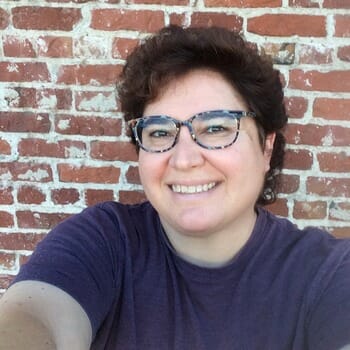
Dr. Bennett is a Post-Doctoral Fellow in Clinical Psychology (PSB 94022544), working under the supervision of Dr. Bravo. Dr. Bennett primarily works with people who are experiencing severe depression, who are on the bipolar spectrum, or who are contemplating suicide. She has been studying the therapeutic properties of ketamine since she first encountered it in 2002. In addition to her clinical work, Dr. Bennett’s practice has evolved to include consultation services for medical professionals who wish to add ketamine services to their offices. She also lectures frequently about therapeutic ketamine. Dr. Bennett is the Founder of KRIYA Institute and the Organizer of the KRIYA Conferences.
In this episode, Joe and Kyle interview Ben Eddy, a Black Belt from Eddy Bravo’s 10th Planet Jiu Jitsu system. In this episode, they cover a range of topics on Jiu Jitsu, Psychedelics and flow state.
3 Key Points:
- Before Jiu Jitsu, Ben says he was very analytical, thinking of the most efficient, fastest way to complete anything. Jiu Jitsu is an ‘in the moment’ type of game, and it allowed him to tap into a flow state.
- Psychedelics have the ability to imprint you and change your thought patterns, and when combined with a sport like Jiu Jitsu, you're able to achieve a type of embodiment you wouldn't have before.
- We do not need to rush into psychedelics at a young age. It is important to experience life for what it is first, and to feel that fully to have a comparison to after diving into the psychedelic realm.
Support the show
- Patreon
- Leave us a review on iTunes
- Share us with your friends – favorite podcast, etc
- Join our Facebook group - Psychedelics Today group – Find the others and create community.
Navigating Psychedelics
Trip Journal Integration Workbook


Show Notes
About Ben
- Ben got into Brazilian Jiu Jitsu when looking for a way to get in shape
- He was in San Francisco in the tech scene
- He was into wrestling in his past and competition and he found that Jiu Jitsu was similar
- His main instructor, Eddie Bravo, was training for a match
- He wanted to be around the energy of this event
- He moved down to southern California and that is where his psychedelic use began
- Ben knew that when he was going to do psychedelics, there was going to be a before and after, that there were going to be doors that were going to be opened
- He says he took the time to really understand the sober life before psychedelics, in order to know the difference
- Ben describes it as a cool opportunity to wait to use psychedelics, he had the choice to wait and experience life and figure out what life is before psychedelics
- Joe says for the younger listeners “meditate on that”, figure out life first before diving into psychedelics
Strategy vs Flow
- Before Jiu Jitsu, Ben says he was very analytical, thinking of the most efficient, fastest way to complete anything
- Jiu Jitsu is an ‘in the moment’ game, where there is more of a ‘flow state’
- He was running into people that could just ‘find answers in the moment’, there was no plan or no strategy, it was a natural flow
Psychedelics and Training
- Training with an active dose was hard to get to at the start
- Ben trains now with active doses
- It has the ability to imprint you and change your thought patterns
- Ben’s active dose is 2 grams of mushrooms during a practice
- Ben does mention that all people are different and his active dose is different than anyone else's
- Jiu Jitsu makes you bring everything that you have up to the forefront in that moment
- Feeling is a way of knowing, especially in these flow states
- He says that weed is commonly used in Jiu Jitsu, but he hasn't seen a whole lot of Psychedelic use yet
- Ben says that weed helps you drop into the one instrument that you're trying to play, get into that flow state
- Jiu Jitsu is a sport of form, technique, and dance, it's not about strength
Origins
- Jiu Jitsu came from Japan and their Judo
- Then it came to Brazil and mixed with the beach vibes and turned into Jiu Jitsu
- Then it came to the west and our beaches and developed into what it is today
- Kyle mentions the idea of using Paul Stamets ‘microdosing’, psilocybin, lions mane and niacin
- In that state we are creating new neurogenesis and neural pathways and being in that state may make us learn differently
- Kyle says its an interesting application for performance and new ways of learning
- Ben says the goal is to get to a certain level of embodiment, at every point you're trying to be present in the here and now
Music
- After Jiu Jitsu, music took on a whole new color, feel and wave for Ben than it did before
- He thought music was a distraction
- Once he started to play with flow more, he began to open up to music to live in it
- Jiu Jitsu and the flow state really start with the breath
- Its like breathing in and accepting life, and the exhale is where it all lets go
Links
About Ben
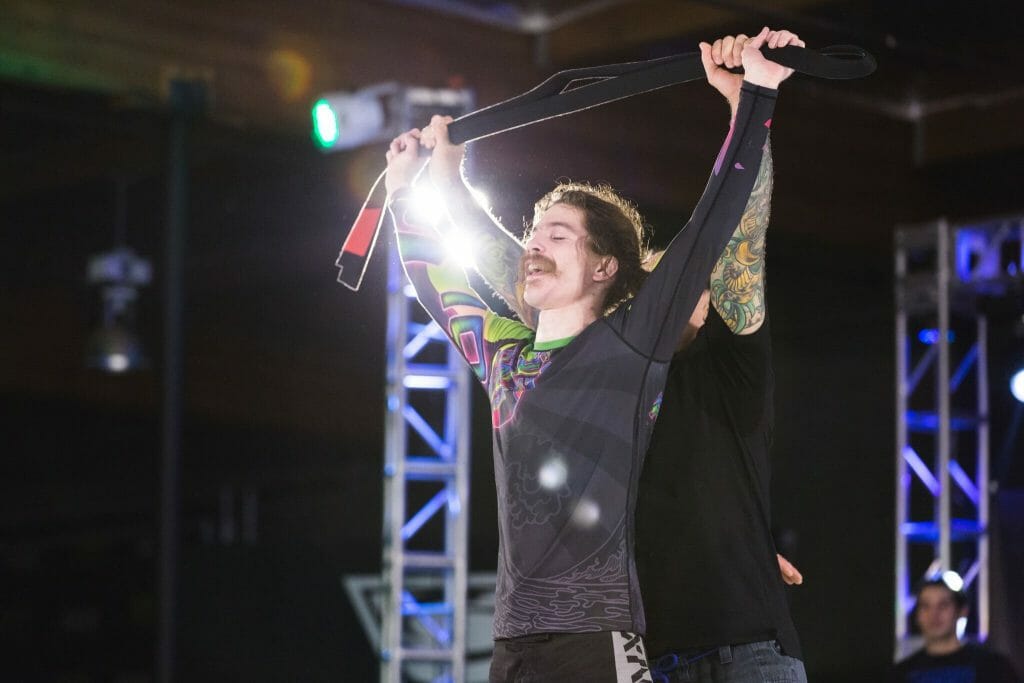
Ben Eddy is a Blackbelt at 10th Planet Jiu Jitsu system. Starting off in the tech scene in San Fransisco, Ben relocated to southern California, where he began his journey into Jiu Jitsu, psychedelics and tapping into the flow state. He currently travels and competes.
In this episode, hosts Joe and Kyle interview Hamilton Souther, Shaman of Blue Morpho. In this episode, they cover Hamilton’s incredible journey from Western life into becoming a Shaman and the spirit teachings that he experienced along the way.
3 Key Points:
- Hamilton Souther, a Shaman of Blue Morpho, shares his experience from living a normal Western life to his journey of his calling, learning and training to become a Shaman. He shares amazing examples of connectedness and spirit while living amongst the natives.
- A common concept that comes out of an Ayahuasca ceremony is that the plants care for you. The teachings that come from the plants are peace oriented and resolution oriented and opening of creativity and problem solving.
- Shamanic training is a long and extremely difficult journey. Training comes to the people that feel the deepest calling, because you have to commit your whole life to it.
Support the show
- Patreon
- Leave us a review on iTunes
- Share us with your friends – favorite podcast, etc
- Join our Facebook group - Psychedelics Today group – Find the others and create community.
Navigating Psychedelics
Trip Journal Integration Workbook


Show Notes
About Hamilton
- He grew up in Silicon Valley
- He went to CU Boulder for Anthropology
- He was interested in humanity
- He wanted to travel and had opportunities to
- He had some near death experiences and accidents when he was younger
- The year after he graduated from college he would go into spontaneous awakenings and altered states of consciousness while totally sober
- He would have really intense visionary experiences in those states
- Those experiences were so powerful which led him into training and into his Ayahuasca experiences
- He felt without purpose and gave himself up to something greater
- He turned to shamanism to try to explain the nature of those experiences
Spontaneous Awakening
- Kyle mentions that this can happen, that substances are not always required for an ‘awakening’
- Hamilton says he wanted to connect to something other than himself
- The path took him to Peru, and there was a possibility of meeting people with Ayahuasca
- He was being called to it and knew they were real and it led to his ‘apprenticeship’ as a Shaman
- It wasn't by accident that he was there, he had visions that he was supposed to stay there and to learn
Discernment
- Coming from a scientific background, he demanded (from the spirit guide) that the process be practical and grounded in reason and logic
- He used doubt in a way that he was able to use a lot of proof and truth toward his belief system rather than just being naive and believing these messages too early
- He couldn't envision how to evolve from the vomiting, defecating human on the ground to the composed shaman in the room
- Even though he spoke the language, he couldn't understand what the people were saying when they shared their stories
- It seemed like a different world to him
- The first few years were learning how to survive in the jungle and learn how to live off of the food
- He says it was like reliving his childhood, he had no idea how to walk through the forest like he knew how to walk down a street growing up
- The first house he lived in out of college was one he built himself with locals
- These experiences were so far from what he grew up in
- Toward the end of his apprenticeship, ceremony started to look less impossible and more of something he would dedicate his life to
Spirit
- In the indigenous communities, everybody sees spirits, especially at night
- And not just in the Ayahuasca culture, its everybody. They thought the jungle was literally alive with spirits
- They would say things like “call me if you need me” and they meant it telepathically
- Hamilton says “sure enough, they do answer when you call”.
- He was in Southern Peru at a pizzeria, and they were in ceremony, and they started to call to him
- He had to excuse himself from the table and go outside and sit with himself and went into an Ayahuasca vision and the two men in ceremony said to him in the vision “we just wanted to call to say hi”
- So Hamilton, using his doubt, wrote down the place and the time of when this happened, and when he returned from his travels and got back to the community, the two men gave him the coordinates and time where Hamilton was when they called him. It matched perfectly
- He realized then and there that they had a very different understanding of the forest and of space time and they were tapped into another kind of knowledge and wisdom
- That's what he was looking for when he came down to the Amazon in the first place
- “The mysteries of consciousness are really unexplored and are not studied by science at all” - Hamilton
- For Westerners, reality and how it is experienced is just a tiny slice of total consciousness
- “When you're in the amazon, and you're living in the forest and you're participating in these visionary experiences, you see the interconnectedness of life.” - Hamilton
- “Globally we've all agreed that education, literacy and participating in the economy is worth it. I think it's worth it to really address on a massive scale what were facing collectively. It's a part of our natural evolution.” - Hamilton
- The plants have a very specific role to play, and that they care
- That's a common concept that comes out of an Ayahuasca ceremony, that the plants care for you
- The teachings that come from the plants are peace oriented and resolution oriented and opening of creativity and problem solving
- Especially with the environmental crisis, people who turn to Ayahuasca start to care for the environment
- Psychedelic plants have a huge role to play in global life, individual growth and collective change
Blue Morpho
- Its a center that Hamilton and the shamans that he works with created
- They did a ceremony to talk with the plants to make sure that this was okay to use as an offering to everyone
- It started in 2003 and evolved over the years to practice traditional ceremony and now San Pedro
- People come from all over the world to visit them
- The majority of the people are really coming for the right reasons, with clear intentions for transformation, growth, exploration and personal healing
- Over 17 years they have focused on bettering services and professionalism and they believe they have truly succeeded
- Ayahuasca is just one aspect of Amazonian plant medicine
- There are hundred of plants with medicinal healing properties
- The Dieta is a period of time where you go into deep individual isolation and connection to a specific medicinal plant where you create a relationship with a plant
- Then you go into the Ayahuasca ceremony and Icaros are sung and you drink the Ayahuasca
- Then the Dieta is a time where there are restrictions such as abstinence, no alcohol, strict food diet, no medications, etc. and you go into a meditative state for healing for a time of a few days, to weeks to even months
Shaman Training
- Training comes to the people that feel the deepest calling, because you have to commit your whole life to it
- Then, you find a lineage of shamans that are willing to accept you (if you aren't born into a lineage of shamans)
- It's a journey, and you have to find a group of people open for training
- It's different from any kind of training from the western world, it's a tremendous journey, and it could take years to decades
- Its meant to be a test, and incredibly difficult
- When Hamilton trained, he was told that 1 out of 100 make it to be actual shamans
- It's really a job of service, not an exalted one
- The reason the training is so incredibly difficult, is so that you can sit with people, who are going through extremely difficult, and transformational experiences and you can be there for them and love and support them unconditionally with the strength gained through the training process
- “Its a role of service, you have to be able to deal with any form of suffering that people come to you with.” - Hamilton
Final Thoughts
- Stay open minded
- He warns about a dystopian world
- We need to be the change makers, and there is a lot we can do
- We are incredibly powerful, especially when we are united in common goals
- Whether they are about human rights or the climate
- There is something mysterious about life itself
Links
About Hamilton Souther
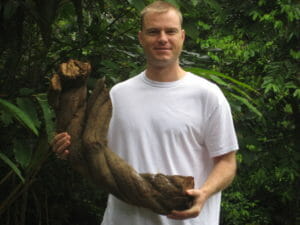
Hamilton focuses his work on Universal Spiritual Philosophy. He is bilingual in English and Spanish, has a Bachelors degree in Anthropology, and has studied shamanism in California, Cusco, and the Amazon. Hamilton was given the title of Master Shaman by Alberto Torres Davila and Julio Llerena Pinedo after completing an apprenticeship under Alberto and Julio. He guides ceremonies and leads shamanic workshops, in which he shares Universal Spiritual Philosophy.
In this episode, Joe records with Sean McAllister, an attorney who helped advise Decriminalize Denver. During this special, extra episode, Sean helps us understand the language in the recent bill for Mushroom Decriminalization in Denver, CO.
3 Key Points:
- Recently, Psilocybin Mushroom Decriminalization passed on the ballot in Denver, CO.
- Psilocybin mushrooms have not been made legal, they have simply been decriminalized. This means that Denver has the lowest law enforcement priority around psilocybin and that no money can be used to criminalize this behavior.
- Decriminalization of Psilocybin in Denver is a big step toward changing the stigma around psychedelics. But we need to be careful, decriminalization is just a tiny step in the right direction and we need to be respectful and responsible with this initiative.
Support the show
- Patreon
- Leave us a review on iTunes
- Share us with your friends – favorite podcast, etc
- Join our Facebook group - Psychedelics Today group – Find the others and create community.
Navigating Psychedelics
Trip Journal Integration Workbook


Show Notes
On May 8th, the city of Denver, Colorado voted yes on I-301, which decriminalizes the possession and use of Psilocybin-containing mushrooms. The official results will be certified on May 16th. As of May 9th - the unofficial results are - yes (50.6%) and no (49.4%).
I-301 decriminalizes adult (21 years or older) possession and use of Psilocybin mushrooms - making these offenses the lowest priority for law enforcement. This initiative also prohibits law enforcement to spend money and resources enforcing arresting adults with possession of mushrooms.
Sean’s Role in the Mushroom Decriminalization in Denver, CO
- Sean is an Attorney with McAllister Garfield Law Firm in Denver
- He has done a lot with cannabis law since 2005
- He heard about the Mushroom Decriminalization campaign and began working with them
- His role started in January to help the team understand what it would look like if the bill passed and his role definitely continues going forward now that it has passed
What the Vote Means
- “Decriminalize” means just that
- Psilocybin mushrooms have not been made legal, they have simply been decriminalized
- “You should never be arrested for putting something in your body that grows naturally in nature.” - Sean
- This means that Denver has a lowest law enforcement priority around Psilocybin
- Its not legal, it's not regulated
- This bill means that a person cannot be imprisoned for possession and cultivation for personal possession amounts
- The city is not supposed to spend any money to criminalize this behavior
- You can grow them to eat them yourself, but you can't grow them to sell them
- This also doesn't mean that groups can host events and ‘give out’ mushrooms as a gift in return for donation, this is not good behavior for this initiative
- This initiative is simply a first step at looking at mushrooms in a better light and reducing the stigma
- For the benefit of this bill passing, we have to be careful about amounts, the smaller the amount of mushrooms the better
- There isn't an amount listed in the bill to distinguish between personal use and intent to sell
- The city has to establish a review commission
- What this commission is supposed to do is track the public safety impact, use, criminal justice impact, etc
- We hope and guess that Psilocybin will not impact any of these, just like how Marijuana did not impact anything for the bad when it was decriminalized
- Once the city sees the results, they won't have so much stigma about it, and Denver will lead the way for the state and the rest of the nation for sensible drug policy
Political Pushback
- The typical response was “we already legalized marijuana, let’s not jump to something else”
- Sean thinks this gives Denver an amazing reputation, that it understands therapeutic ability and research and no tolerance for the drug war
- “We need a system that addresses public safety concerns but maintains as much personal liberty as possible on these topics” - Shane
Other Initiatives
- Sean is a part of Chacruna, based in San Francisco
- Oakland is attempting to Decriminalize Nature, which by nature means all naturally occurring substances
- They aren't on a ballot, they are looking to convince city council to agree with it and accept it
- California attempted to raise signatures to be on the ballot in the 2018 election but it failed to get on the ballot
- Oregon is now collecting signatures to get on the ballot at the state level in 2020
- Oregon's model is for medicalization, Sean expresses concern for a purely medical model
- Between big pharma and quiet equity firms, they want to monetize on psychedelics like they did with marijuana, and that's what we risk with medicalization
- Psychedelic Liberty Summit in 2020 in the Bay Area will be to talk about the rights and wrongs around psychedelic initiatives
Final Thoughts
- Sean mentions a possible system that revolves around a licensing structure
- Similar to how we get a drivers license; we practice, we take tests, etc.
- For psychedelics, we would need to learn the effects, harm reduction techniques, take tests to verify our knowledge, etc and receive a license that allows us to use psychedelics freely
- If we abuse psychedelics and use them improperly, then we would get our license taken away, suspended, etc.
- Overall, after this initiative passing, we have to be careful we don't ruin this victory with poor behavior
- Let’s just do what we're doing respectfully, responsibly, and to ourselves
Links
- https://mcallistergarfield.com/
- https://chacruna.net/council-for-the-protection-of-sacred-plants/
- https://www.linkedin.com/in/attyseanmcallister/
About Sean McAllister
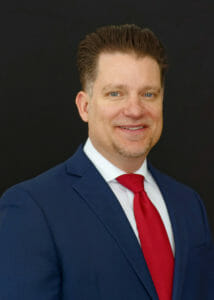
Sean T. McAllister is one of the nation’s leading cannabis business attorneys, licensed to practice law in both Colorado and California. Sean’s legal work focuses on the complex interplay between corporate law and state cannabis regulatory structures and federal law. Sean is a recognized leader in the cannabis industry. In 2004, he founded Sensible Colorado, which worked on all of the ballot initiatives in Colorado that culminated in recreational cannabis legalization in 2012.
In this episode, Joe talks with Shane LeMaster, Licensed Addiction Counselor and Certified Mental Performance Consultant. Shane is also involved in Psychotherapy as well as Sport and Performance Psychology and Psychedelic Integration Therapy. In this episode they cover a range of topics such as social work, Ketamine, sensory deprivation, psychedelic icons and the psychedelic culture.
3 Key Points:
- Shane has a podcast of his own, and his goal with the podcast is to bring people’s personal experiences to light to learn from them, to master the potential of our minds.
- Ketamine is a great gateway to opening up people’s minds to all of the other psychedelics. Its also a great place to start for therapy.
- Every single facilitator or shaman has different techniques and styles and that's okay
If we don't have differences then we won't have styles to choose from.
Support the show
- Patreon
- Leave us a review on iTunes
- Share us with your friends – favorite podcast, etc
- Join our Facebook group - Psychedelics Today group – Find the others and create community.
Navigating Psychedelics
Trip Journal Integration Workbook


Show Notes
About Shane
- Joe and Shane met up recently at a Psychedelic Club meeting about harm reduction in Fort Collins
- Shane just got accepted into the PhD program in social work at CSU
- He had been pursuing a PhD program in psychology and it wasn't working out for him so he decided to take the social work route
- He works with many people and has developed a strong skill set on the micro level and he wants to start making impact on a macro level with helping people
Social Work
- Shane thinks of social work as an integrative approach for every discipline that we find useful, to come to a holistic, greater understanding of an issue
- Shane wants to use Ketamine as a ‘medium’ term goal, because it's legal
- But ketamine is not where he is going to stop, he finds there are benefits in many other substances
- He would love to work with LSD and Psilocybin
- He will continue to offer his services through his business Mind Ops
- Shane’s Podcast - Conversations with the Mind
- His goal with the podcast is to bring people’s personal experiences to light to learn from them
- It's important to create dialogue and invite people for conversation with differing opinions
- The goal is to create a theory that implements both opinions
Ketamine
- Ketamine is a great gateway to opening up people’s minds to all of the other psychedelics
- Shane has had a lot of personal and recreational experiences on Ketamine and when he returns to it as a medicine, he is able to attain and sharpen skills for mindfulness
- Joe brings up the idea that recreational ketamine could have the ability to bring up past trauma or may re-traumatize someone if not used therapeutically
- Ketamine has a lot of risks, but being educated and using the substance correctly can be absolutely beneficial
- Shane says we shouldn't try to avoid trauma, we should accept it and use it for good and let it power us
- “Sometimes we don't even know what were suppressing. We need some assistance to show us what were avoiding in life and I think that psychedelics help with that a lot.” - Shane
Sensory Deprivation
- Shane says he’s interested in John Lilly's work from back in the day and his terminology of being able to meta-program your human brain
- Joe says John Lilly was a big part of isolation chambers which led to float tanks
Psychedelic Icons
- Joe mentions Robert Anton Wilson, he was good friends with Timothy Leary
- He had great critiques, great books and worked with Leary on the 8 levels of consciousness
Joe suggests listeners to read The Illuminatus! Trilogy: The Eye in the Pyramid, The Golden Apple, Leviathan
- He had great critiques, great books and worked with Leary on the 8 levels of consciousness
- “My interest is not in psychedelics themselves, but psychedelics as a means to access higher states of who we are, parts we have forgotten.” - Shane
- Psychedelics are just one way to tap into ourselves and discover our ultimate potential
- “We should all be questioning, everyday, changing our belief systems” - Shane
- “Belief is the death of intelligence” - Robert Anton Wilson
- Shane says a lot of people give Leary a bad rap, but Shane appreciates what he has done
- Joe mentions ‘smile squared’ - Space, migration, intelligence and life extension
- TFYQA - Think for yourself question authority
- “Turn on, Tune in, Drop out” - Timothy Leary
- Shane says that phrase sticks with him, it called to his rebel phase in youth to grow and do this work in his life
The Psychedelic Culture
- Splitting - a rephrase of divide and conquer
- Joe says the psychedelic world is very cut throat
- "We should take care of each other a bit more in this space" - Joe
- Shane says, we need to lift each other up versus look for ways to step over each other
- Every single facilitator or shaman has different techniques and styles and that's okay
- If we don't have differences then we don't have styles to choose from
- “We can't become fundamentalists in our own practices, we need to value the differences culturally and from a world view. They are all valuable.” - Shane
Links
About Shane
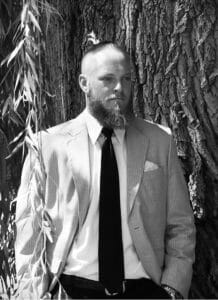
Shane earned his Bachelor of Arts Degree in Psychology from the University of Colorado in Boulder, CO, completed extensive coursework towards a Master of Arts Degree in Sport & Performance Psychology at the University of Denver, and earned his Master of Arts Degree in Sport & Exercise Psychology from Argosy University.
Shane is nationally certified as a Sport Psychology Consultant and a licensed mental health clinician in the state of Colorado. Having worked in community non-profit mental health since 2008, Shane has gained experience working with the entire spectrum of mental disorders and with all populations and age groups. Shane plans on attending a Ph.D program in Counseling Psychology where his interest in Resiliency, Mental Toughness, and Mindfulness Training Program Development can be explored and further developed.
He is a life-long athlete having competed at various levels in more than a dozen different sports. Because of his passion for warrior cultures of past and present, Shane has been ardently developing his own “Warriorship,” training in various forms of Martial Arts for 25 years. Shane feels that the self-discipline, the philosophy of non-violence, the innumerable mental and physical benefits, and the enjoyment that he gains from the Martial Arts is what helped drive his passion in the field of Psychology.
His personal interest in Eastern Philosophy stems from his adoption of a Buddhist lifestyle and blends well with his training in Western Psychological Science. Clients describe Shane as an out-of-the-box clinician that is easy to get along with, knowledgeable on a variety of topics, credible with lived experience, and as having the ability to make therapy fun and interesting.
In this episode, Kyle hosts a conversation with Veronika Gold from the Polaris Insight Center, a center that offers Ketamine Assisted Psychotherapy. They compare and contrast Ketamine Psychotherapy methods and Ketamine Infusion.
3 Key Points:
- The most studied way of using Ketamine has been infusion, mainly used for treatment resistant depression and PTSD. Veronika used lozenges and intramuscular Ketamine therapy working for Polaris.
- When people are healed from depression, there is a lot of anxiety and activation that happens. Infusion clinics don't offer the therapeutic help that comes with Ketamine Assisted Psychotherapy.
- The dissociation that happens with Ketamine is a different dissociation that happens with trauma. With trauma, dissociation happens when the nervous system can't handle the stress in someone's life, with Ketamine, it allows people who feel dissociated from their trauma, to feel again.
Support the show
- Patreon
- Leave us a review on iTunes
- Share us with your friends – favorite podcast, etc
- Join our Facebook group - Psychedelics Today group – Find the others and create community.
Navigating Psychedelics
Trip Journal Integration Workbook


Show Notes
About Veronika
- She specialized in trauma treatment
- She is involved in the clinical trials for the treatment of PTSD, sponsored by MAPS in San Francisco
- Veronika is originally from Czech Republic
- She studied at CIIS
- She grew up in the Czech Republic in a communist time so she dealt with a lot of trauma
- She met Stan Grof at 16 at a Transpersonal conference
- She was fascinated with his work and Transpersonal Breathwork became a part of her healing
- It lead her to study psychology and become a psychotherapist and study non-ordinary states
Ketamine Assisted Psychotherapy
- Ketamine therapy has been studied from the late 60’s until today
- The most studied way of using Ketamine has been infusion, mainly used for treatment resistant depression and PTSD
- In Ketamine Assisted Psychotherapy, the therapy is as important as the medicine
- There is a biochemical effect of Ketamine
- When people are healed from depression, there is a lot of anxiety and activation that happens
- Infusion clinics don't offer the therapeutic help that comes with Ketamine Assisted Psychotherapy
Benefits of Ketamine Psychotherapy
- The treatment method used at Polaris includes a comfortable room, eye shades, music tailored to the therapy, and an ongoing therapist
- They use non-ordinary states of consciousness as a part of the transformation
- They use lozenges and IM (Intramuscular)
- Only 30% of the ketamine from the lozenges are effective
- The lozenges allow for a slow onset of the medicine
- With IM, a higher dose can be used because it's less taxing on the body and more effective
- The property of Ketamine is dissociation
- Veronika says she prompts people to explain where they are, to share about what comes up for them
- “Sometimes there are memories that come up that are connected to their struggle. Sometimes they do full trauma processing. There are times where they go inside and then come out.” - Veronika
Ketamine vs. Classic Psychedelics
- They used Ketamine as a means to do the work legally
- For the work that is being done underground, the therapists are putting themselves at risk for legality, and it does impact set and setting
- But even if other substances were legal, Veronika thinks Ketamine will still be used for certain issues
- Ketamine is described as a +4 on Shulgin’s scale
- A moderate to high dose can allow people to have a near death experience or ‘review of their life’
- The dissociation that happens with Ketamine is a different dissociation that happens with trauma
- With trauma, dissociation happens when the nervous system can't handle the stress
- Opposingly, with Ketamine, it allows people who feel dissociated, to feel again
- Veronika mentions a study that says the higher the effects of dissociation from a Ketamine session, the higher the antidepressant effects are.
- She has work in somatic studies and organic intelligence
Breathwork
- Veronika’s experience with Breathwork helps her understand her patients
- The bodily experience that happens in Breathwork also helps her understand the body movement/energetic blockages, etc that happen in Ketamine therapy
- The last 30-90 minutes is where the integration starts
Sessions
- They do mainly one-on-one session but have done a few pair therapy sessions
- Veronika says its easier to do one-on-one because the sessions are short and there is a lot of internal work
The Future of Ketamine
- Veronika is excited about people’s curiosity with Ketamine therapy and the effectivity of it
- Ketamine is a new and emerging field and we are figuring out who it is useful for and who it is not
- Veronika says that non-ordinary states are all beneficial for healing, and not having to use Ketamine (using Breathwork) is still beneficial
- “A big part of the healing is having a positive experience and connecting with places that feel good, having positive visions. Its supportive for our nervous system and our ability to heal.” - Veronika
- “When we allow the inner healing intelligence to come through, it will take us to where we need to go.” - Veronika
- Patients don't always need to just feel the dark stuff and the trauma, sometimes sitting with the good feelings and remembering what good feels like is a part of the healing too
- Kyle and Veronika were both on separate episodes of the Consciousness Podcast with Stuart Preston
Links
About Veronika Gold

Veronika has expertise in the treatment of trauma. Her approach is integrative and informed by Somatic Therapies, contemplative practices, and mindfulness. She also has an interest in educating others about the healing and transformational potential of non-ordinary states of consciousness.
Download
In this episode, Joe talks with Matthew Remski, yoga teacher, consultant and author. In the show they talk about high demand group life and their cultic mechanisms, and the after effects of living in a high demand group setting.
3 Key Points:
- Matthew Remski shares his experience of spending most of his 20’s in cults, and his healing journey afterward.
- Cults aren't defined by their content (political, religious, psychedelic), they are defined by their element of control. Another term for a ‘cult’ is a high demand group.
- High demand groups can be very appealing from the outside, no one signs up for the rape, torture, or manipulative experiences that happen inside of a cult. And the after effects from high demand group life can be extreme, such as PTSD, inability to form romantic relationships, etc.
Support the show
- Patreon
- Leave us a review on iTunes
- Share us with your friends – favorite podcast, etc
- Join our Facebook group - Psychedelics Today group – Find the others and create community.
Navigating Psychedelics
Trip Journal Integration Workbook


Show Notes
About Matthew
- Yoga was a safe space of retreat and recuperation after being in cults
- He was in a cult for 3 years led by Michael Roach at the Asian Classics Institute
- He was in Endeavor Academy for 6 years in Wisconsin Dells, Wisconsin
- These experiences gave him group dynamic perspective
- Yoga gave him somatic autonomy, and allowed him to feel himself again after the cultic nature of the groups
- He spent age 22-29 in these groups where we would have built some sort of career, and he didn't
- He became a yoga teacher and opened his own yoga studio as a part of his healing
Cults
- People end up doing harm to themselves, or do things that they didn't sign up for
- An organization misrepresents itself, and presents itself as a safe haven for people who may be vulnerable for any reason
- High Demand Organization, along with other synonyms, are other words for ‘cult’
- ‘Self Sealed’ implies that everything that happens within the group is to have the individual think it's for the ‘good’, a ‘bounded choice’ environment (saying that sexual advances or torture are a part of the development toward enlightenment, for example)
- The high demand group rewires a person's attachment patterns to make them ‘unattached’
- Steve Hassan’s BITE model
- Behavior Control
- Information Control
- Thought Control
- Emotional Control
- The content of the cult doesn't matter (religious, psychedelic, political, etc), it's the element of control that is the same amongst true cults
- There can be political groups that aren't cults, but the element of control is what defines it as a cult
- Octavio Rettig and Gerry Sandoval
- They are perhaps responsible for multiple deaths (maybe not directly but through negligence)
- They use 5-MEO-DMT with abuse and malpractice
Cult Impact
- The impact from a cult can be cognitive, labor related, relationship/family oriented, etc.
- Matthew says the estrangement from his family has taken over a decade to repair
- The relationships he had prior, has been unable to restored
- His identity was changed for him through social coercion
- “The cult takes its best possible part of you for its own agenda” - Matthew
- The after effects from high demand group life can be extreme, they can have PTSD, they may not be able to form romantic bonds, they may become estranged from their family, etc.
- Recent estimates in the US alone say that there are 8,000 high demand groups
- These dynamics can be found in many organizations
- Wild Wild Country - When a controversial cult leader builds a Utopian city in the Oregon desert, conflict with the locals escalates into a national scandal
Psychotherapy Cult
- Psychotherapy cults look like a Buddhist or yoga cult but with different group practice techniques
- They will depend upon group psychotherapy that break down and humiliate members and create fear that looks like love and acceptance
- It includes members revealing intense secrets so they become vulnerable
Practice And All Is Coming: Abuse, Cult Dynamics, And Healing In Yoga And Beyond
- Matthew’s book is applicable in many different community constellations
- His intention is to help foster critical thinking and community health
- Joe says that anyone in a group dynamic or especially those leading groups (such as an ayahuasca circle) need to read this book
Practice And All Is Coming: Abuse, Cult Dynamics, And Healing In Yoga And Beyond
Links
About Matthew
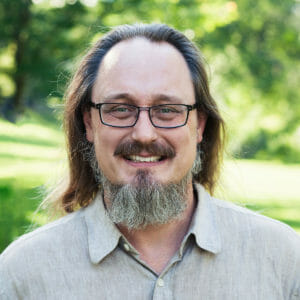
Matthew has been practicing meditation and yoga since 1996, sitting and moving with teachers from the Tibetan Buddhist, Kripalu, Ashtanga, and Iyengar streams. Along the way he has trained as a yoga therapist and an Ayurvedic consultant, and maintained a private practice in Toronto from 2007 to 2015. From 2008 through 2012, he co-directed Yoga Festival Toronto and Yoga Community Toronto, non-profit activist organizations dedicated to promoting open dialogue and accessibility. During that same period, he studied jyotiśhāstra in a small oral-culture setting at the Vidya Institute in Toronto. Matthew currently facilitates programming for yoga trainings internationally, focusing on yoga philosophy, meditation, Ayurveda, and the social psychology of practice. In all subject areas, he encourages students to explore how yoga practice can resist the psychic and material dominance of neoliberalism, and the quickening pace of environmental destruction.
In this episode, Joe interviews Computational Neuro-Biologist, Dr. Andrew Gallimore, one of the world’s knowledgeable researchers on DMT. In the show they discuss DMT and the possibilities of being in an extended state of DMT, such as accessing higher dimensions and communicating with intelligent entities.
3 Key Points:
- This reality that we are in is a lower dimensional slice of a higher dimensional structure. DMT is a technology or tool that allows us access to reach out to these higher dimensions.
- Andrew has developed and written about the Intravenous Infusion Model, which allows a timed and steady release of DMT to induce an extended state DMT experience.
- Extended state DMT hypothesizes that with enough time spent in the DMT space, the ‘map’ of the space would begin stabilize over time and you could develop a ‘life’ in the DMT space like we do in our waking life.
Support the show
- Patreon
- Leave us a review on iTunes
- Share us with your friends – favorite podcast, etc
- Join our Facebook group - Psychedelics Today group – Find the others and create community.
Navigating Psychedelics
Trip Journal Integration Workbook


Show Notes
About Andrew
- Since age 15, he was into psychedelic drugs and altered states of consciousness
- He was at a friends house and was looking at a book called Alternative London and it had writings on different psychedelics but only a very short segment on DMT
- His fascination grew from his yearning to learn more about DMT
- His interest turned into academic work, learning chemistry and pharmacology and he is now into learning more about the brain itself
- He is currently a Computational Neuro-Biologist
DMT
- DMT is a compound found almost everywhere in nature, highly illegal, yet highly interesting
- Interaction with entities are common
- All frames of reference are gone
- Andrew says that the first few times were very intense and he would come back with no way to comprehend or describe it
- Then after a few more times he started to see the entities and have a more stable experience with more intent
- Andrew describes a very vivid experience of a man in a dark robe where he asked him “show me what you've got” and he opened his mouth and Andrew woke up a if he had seen God himself. He describes it as a shattering experience
- These beings in the DMT experience, aren't just pointless beings in a dream, they are powerful and extremely intelligent
- We don't have any way to comprehend the levels of intelligence in this dimensional space, we only are ever able to experience intelligence with our human capacity for what intelligence is
- There is a sense that these beings are intelligent because they have been around for billions and billions of years or potentially infinitely
Communicating with Intelligent Entities
- He calls his book the ‘textbook of the future’
- “We are imprisoned in some kind of work of art” - Terence McKenna
- This reality is a construct or artifact of the alien intelligence or the ‘other’
- “This reality that we are in is a lower dimensional slice of a higher dimensional structure. DMT is a technology or tool that allows us access to reach out to these higher dimensions” - Andrew
- DMT is everywhere
- “Nature is drenched in DMT, but it takes a high level of sophisticated intelligence to identify it, isolate it, and discover a means of using it as a tool” - Dennis McKenna
- “In order to communicate with these beings, we need to bring the right tools to the table” - Andrew
- Target Controlled Intravenous Infusion Model - using the same model for DMT as the anesthesia model
- It uses administration of a short acting drug using a mathematical model to control the release
- “We are not just passive receivers of information but we are actively constructing our world from moment to moment.” - Andrew
- Continuity Hypothesis of Dreaming - it says that dreaming is continuous with our waking life, the brain constructs the world when you're asleep in the same way that it does when you're awake
Extended State DMT (DMTx)
- Our brains are constantly updating its model of reality, so if you put someone through the DMT space for months at a time, that person’s model of reality would completely shift
- This idea has been completely unexplored
- The hypothesis is that an extended time in the DMT space would begin to make that space more stable over time, the goal being to live in the DMT space as you would in this reality of waking life
- The measurement of DMT in the blood with Ayahuasca is 1/5th the level of DMT in the blood as a breakthrough DMT experience
- Andrew hasn't heard of anyone trying the Intravenous Infusion Model yet
- There is this space that exists one quantum away, and it is accessible by everyone (technologically, not necessarily legally)
- Inter-dimensional citizenship is close at hand
Links
Book
Alien Information Theory: Psychedelic Drug Technologies and the Cosmic Game
About Dr. Andrew Gallimore
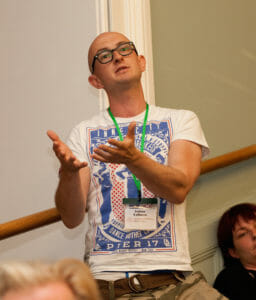 Dr. Andrew Gallimore is a computational neurobiologist, pharmacologist, chemist, and writer who has been interested in the neural basis of psychedelic drug action for many years and is the author of a number of articles and research papers on the powerful psychedelic drug, N,N-dimethyltryptamine (DMT), as well as the book Alien Information Theory: Psychedelic Drug Technologies and the Cosmic Game (April 2019). He recently collaborated with DMT pioneer Dr. Rick Strassman, author of DMT: The Spirit Molecule, to develop a pharmacokinetic model of DMT as the basis of a target-controlled intravenous infusion protocol for extended journeys in DMT space. His current interests focus on DMT as a tool for gating access to extradimensional realities and how this can be understood in terms of the neuroscience of information. He currently lives and works in Japan.
Dr. Andrew Gallimore is a computational neurobiologist, pharmacologist, chemist, and writer who has been interested in the neural basis of psychedelic drug action for many years and is the author of a number of articles and research papers on the powerful psychedelic drug, N,N-dimethyltryptamine (DMT), as well as the book Alien Information Theory: Psychedelic Drug Technologies and the Cosmic Game (April 2019). He recently collaborated with DMT pioneer Dr. Rick Strassman, author of DMT: The Spirit Molecule, to develop a pharmacokinetic model of DMT as the basis of a target-controlled intravenous infusion protocol for extended journeys in DMT space. His current interests focus on DMT as a tool for gating access to extradimensional realities and how this can be understood in terms of the neuroscience of information. He currently lives and works in Japan.
In this episode, hosts Joe and Kyle interview music artist, East Forest. Influenced by psychedelic Psilocybin sessions, Trevor Oswalt, the mind behind the project, produces soundtracks for psychedelic journeywork sessions.
3 Key Points:
- East Forest is a music artist and producer with a mission to create a playground of doors for listeners to open and to explore their inner space.
- His recent project, ‘Ram Dass’, captures the words of wisdom of Ram Dass and pairs it with sound, a project with four chapters that will release throughout 2019.
- Ayahuasca is connected to the Icaros, but psilocybin doesn't have a music ritual. His goal with his project, Music for Mushrooms: A soundtrack for the psychedelic practitioner, is to bring ritual to psilocybin journeywork.
Support the show
- Patreon
- Leave us a review on iTunes
- Share us with your friends – favorite podcast, etc
- Join our Facebook group - Psychedelics Today group – Find the others and create community.
Navigating Psychedelics
Trip Journal Integration Workbook


Show Notes
About (Trevor Oswalt) East Forest
- East Forest is a 10 years and running music project that unfolded exploring into sharing and medicine circles and developed into a public interface
- Its based around introspection and tools for people to use
- Between retreats, podcasts and live performance, Trevor is inviting people in to assist with their journeys
Ram Dass
- Trevor is working on a 4 part record project with Ram Dass
- He had the idea to do a record with spiritual teachers
- Ram Dass had a stroke 20 years ago, and he got Aphasia from it
- It would take him 15-30 minutes to answer a question, so Trevor would put it to the music and put Ram's words on the pauses in the music
- His wisdom and story would come alive in the songs
- The first time Ram Dass did psilocybin was with Timothy Leary and he said it changed his life
- Ram Dass talks about the ‘witness consciousness’ a viewpoint of things from the soul
- It is a place where you can love everyone and tell your truth and accept your dark thoughts
- You can't get rid of your dark thoughts, but you can learn to live with them
Journeywork Soundtrack
- Music for Mushrooms: A soundtrack for the psychedelic practitioner
- Its a 5 hour playlist for journeywork that guides you and helps you do the work
- He made it live during his own journeywork session over a weekend the previous summer
- He says he is influenced by Keith Jarrett, who does long form pianist pieces
- Joe says trance in music is under explored
- Trevor describes a trip that he had where he took mushrooms and listened to his own (first) album that he made
- “It was as if I created this album without knowing what I was creating. My soul had tricked my ego into doing it so I could use it as a tool in that moment to transform into something new.” - Trevor
- There is a lot of music, science, and arts that are inspired by psychedelics
- He describes its a symbiotic relationship between psychedelics and music
- That's the thing about art, you put it out there and everyone puts their own meaning to it
- His first experience with psychedelics was in college with mushrooms
- He was outside at a festival and it was a very transcendent, blissful experience
Retreats
- He attends retreats where there is either yoga, wilderness hikes or mainly revolved around music
- He does a retreat using music at Esalen with his partner, Marisa Radha Weppner
- They are doing another retreat in June at Esalen during the summer solstice and he will also be releasing the third chapter of the Ram Dass Record
- Next Esalen Retreat
Sound
- He went to Vassar college in New York and there were pianos all over the school, he learned how to play simple songs and was shocked of how great it sounded coming to life and that fed on itself and he was hooked
- His first album was made in iMac with pro tools and his skills developed from there
- Sound quality is critical in journeywork
- Joe’s friend has mentioned that it's hard to make a living as a music creator, she goes by Living Light
- Joe also mentions a festival he attended listening to Reed Mathis and the Electric Beethoven
- They went on a 20-30 minute talk about how the music is a ritual
- Kyle used to lead some hikes, once was with Trevor Hall and it has gotten more common to collaborate these experiences with music
Live Music
- During Ayahuasca, the shamans sing the Icaros, and the song is a part of the ritual
- No one uses Ayahuasca recreationally, the ceremony has never been detached from the drug
- With psilocybin, in the western culture, it's almost always only been used recreationally
- His goal was to create a new musical tradition that would speak to our western years and make sense to us without taking from another religion and putting it to our ritual
Links
About East Forest

East Forest is an American Ambient/Electronic/Contemporary Classical/Indie Pop artist from Portland, Oregon, United States. The project was created by Trevor Oswalt who derived "East Forest" from the German translation of his last name. To date he has released eight full-length albums and six EPs. East Forest’s newest release, “RAM DASS” is a full length album releasing in collaboration with the acclaimed spiritual teacher. Covering topics such as dark thoughts, nature, the soul and so much more, these songs are full of inspiration. The album will release in four “chapters” throughout 2019, culminating in a full length release on August 9, 2019.
In this Bonus episode The Teafaerie and Joe Moore get into lots of great topics. Enjoy! !
The Teafaerie micro-bio(me)
The Teafaerie is a writer, flow arts teacher, ruespieler, toy inventor, app designer, street performer, party promoter, and superhero.
erowid.org/columns/teafaerie
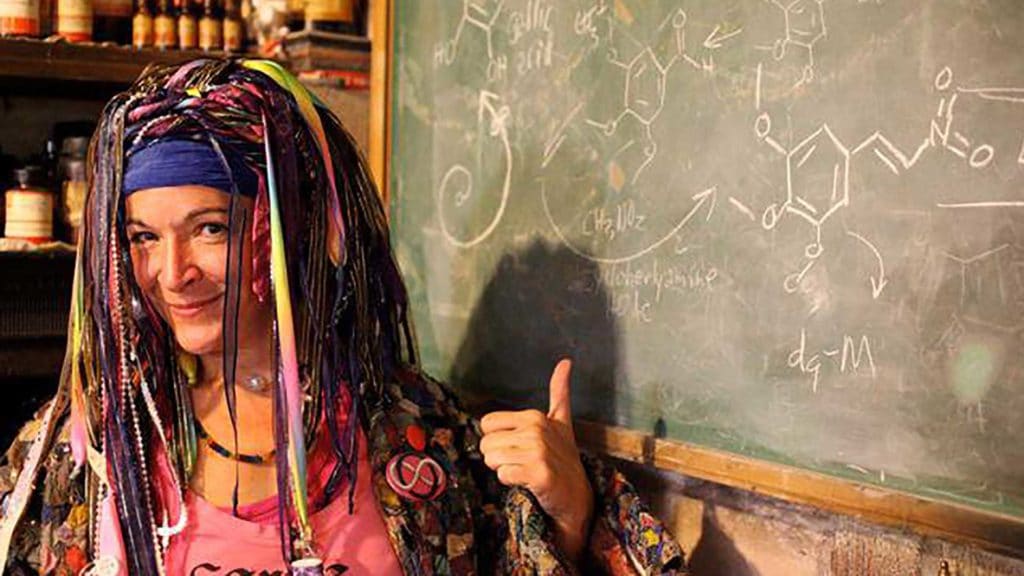
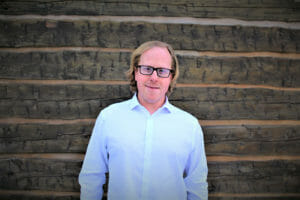
Some links
Event in Ran Rafael, CA w Tam Integration
Mapping the Source on Erowid
Carrying the Light - Audio
Telepathetic - https://www.erowid.org/columns/teafaerie/2013/02/21/telepathetic/
The Teafaerie on Instagram - https://www.instagram.com/flowfaerie/
Twitter - https://twitter.com/ruespieler
In this episode, Joe interviews Jesse Gould, founder of Heroic Hearts Project, a non-profit doing psychedelic work with veterans. They discuss the difficulties veterans face finding healing from their PTSD in the current landscape.
3 Key Points:
- Heroic Hearts is a project geared toward raising funds and providing resources for veterans to receive healing through Ayahuasca and other psychedelics.
- Our current landscape of social media and government make it extremely difficult to receive donations and get veterans the help that they need. Heroic Hearts is trying to bridge the gap between PTSD and access to healing.
- Veterans tend to feel alone in their symptoms from their experiences, so creating community and an integration plan are both really important in the healing process.
Support the show
- Patreon
- Leave us a review on iTunes
- Share us with your friends – favorite podcast, etc
- Join our Facebook group - Psychedelics Today group – Find the others and create community.
Navigating Psychedelics
Trip Journal Integration Workbook


Show Notes
About Jessie
- Founder of Heroic Hearts Project
- He found the healing potential of Ayahuasca after a week long retreat after struggling with severe anxiety after combat deployments with the army
- He was born in Santa Fe, New Mexico and grew up in Florida
- Jesse graduated with an Economics Degree from Cornell
Heroic Hearts
- Heroic Hearts is trying to be the voice of veterans in the psychedelic community
- There are very few options through the department of veteran affairs
- The organization helps raise money to provide opportunity for veterans to access treatment such as Ayahuasca retreats
- PTSD and Addiction affect the veteran community more than the general public
- Aligning the veteran voice with the psychedelic cause is a powerful force for change
- Integration is so important, both to understand what you're trying to achieve (beforehand) and stay on that path (afterward)
- Jessie says they work very hard to make sure vets are having true healing through their Ayahuasca experiences
PTSD
- People have a common misconception around PTSD that there are these constant traumatic outbreaks, and although that can happen, there are so many people living their day to day lives and you'd never know they have PTSD but they still suffer from it
- PTSD doesn't always come from severely traumatic events like war, it can come from other things like childhood abuse or sexual assault
- SSRIs numb the pain but don't help with any actual healing
Donations
- It's really hard to get donations
- Heroic Hearts provided financial scholarships so far to about 15 people
- They are doing a retreat in May for another 7 veterans
- The received a grant from Ubiome to study the effects of Ayahuasca on the gut microbiome
- There is a strong link between the stomach biome and mood
- They are coming up with do it yourself marketing campaigns to help individuals raise their own money, setting people up for success
- In a place where it's easier to get money, it's also harder to get money because so many people are creating personal fundraisers for their dog, etc.
- There are more and more large organizations helping smaller companies like Heroic Hearts with research
Community
- Breathwork can be used as a helpful bridge between patients and their PTSD
- Veterans tend to trust veterans more
- They tend to feel alone so creating community among vets is really important
- Psychedelics and ceremony really help vets transition out of feeling alone
- Jesse says he plans on creating local meetups and groups for vets
- He tends to send vets on retreats with friends or other vets from the same community so when they return from their retreat they have a built-in community to come back to
Heroic Hearts Project
- There is an application for vets
- There are many options to donate, all funds raised go right to the vets
- “Why is there no government funding going to the biggest breakthrough in PTSD research through the MAPS MDMA therapy? Not one cent of government money has gone to that.” - Jesse
- “Why are we having to send veterans to other countries to get the mental health that they deserve?” - Jesse
Links
About Jesse Gould
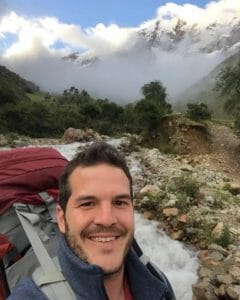
Jesse founded Heroic Hearts Project after attending an Ayahuasca retreat in Iquitos, Peru on February 2017. During the week long retreat he instantly saw the healing potential of the drink and knew that it could be a powerful tool in healing the mental struggles of his fellow veterans. Jesse was born in Santa Fe, New Mexico and grew up in New Smyrna Beach, FL. In 2009 he graduated from Cornell University with a degree in Economics. After working in investment banking for a short time he enlisted in the Army and became an Airborne Ranger for four years and three combat deployments. Most recently, he worked in finance in Tampa, FL After struggling with severe anxiety for many years, he finally decided to go to an ayahuasca retreat which has had a profoundly positive effect on his anxiety and daily life.'I know what it is like to be at the mercy of uncontrollable elements in your own head. I also know the extreme relief of finally having these elements under control. Ayahuasca provided this. We have the ability to help thousands who are suffering but we let politics and ignorance get in the way. This is unacceptable. I started this foundation because the therapy works, I will risk what I have to ensure my fellow veterans get the treatment they deserve and a new chance at life.'
In this episode Kyle sits down with a close friend in the psychedelic space, Lucas Jackson. They have shared many experiences such as Near Death Experiences, leading breathwork workshops, and other similarities. They cover topics such as the Near Death Experience, Ayahuasca experience, Breathwork tools, and accepting death, finding meaning and integrating these exceptional experiences.
3 Key Points:
- Exceptional experiences are not always euphoric and light, they can also be dark and cathartic and make it difficult to transition back into ‘real life’.
- Lucas explains his Ayahuasca experience as his darkest and hardest. He felt alone with no help, no one to talk to to help understand it, he felt as if he actually died. But this gave him a realization and acceptance of death.
- The key to making it through and putting understanding to the dark experiences is having the right tools, such as a community of understanding people, practices such as breathwork, yoga, meditation and just simply coming back to the breath.
Support the show
- Patreon
- Leave us a review on iTunes
- Share us with your friends – favorite podcast, etc
- Join our Facebook group - Psychedelics Today group – Find the others and create community.
Navigating Psychedelics
Trip Journal Integration Workbook


Show Notes
About Lucas
- Lucas' interest in psychedelics started in high school, the books that he read then were influential
- He had a near death experience at 19
- He came down with a lung issue and was in the hospital for 2 months and in and out of different stages of consciousness
- After that experience his interest for psychedelics and breathwork grew
- Lucas describes it not totally as a single NDE but more as being so close to death for an extended period of time
- He says it wasn't mystical and great, coming back to ‘real life’ had some dark qualities
Revisiting a Dark Past
- Lucas says he wrote stuff down when he was in the hospital with a breathing tube and couldn't talk and one day he went through it all and it was very dark and cathartic
- When he went through and read his past writings, he said that he felt sympathy for the ‘him’ that wrote it
- He says it is hard to remember the person he was before his experience and illness
Breathwork
- After he dropped out of school, he started up a farm in Vermont and then toward the end of that he started to feel restless and there were synchronicities that led him to breathwork
- He heard that Stan Grof was going to be doing a talk at a local bookshop and he met Lenny and Elizabeth Gibson
- He ended up doing breathwork training in New York
- He explains the experience as more powerful than what he would have imagined
- He said he wanted to tell everyone about it after the first breathwork experience
- Kyle says its common with any exceptional experience, people want to run and tell the world
- Lucas says the sitting was just as powerful as the breathing
- It's not often that you have someone sit at your side for 2-3 hours giving you full attention
- Lucas says that his GTT training was supposed to take 2 years and he thought he was going to get through it in 2 years no problem and he is in his 5th year doing the program and he loves the pace
- Kyle says that part of the training in breathwork is doing your own work
- Lucas says with this kind of work, you don't get through it and you're done, It's a continuous process
- Robert Anton Wilson’s ‘maybe’ logic helps Lucas with being okay with not knowing
- He had a few experiences where he went through a ‘death’ feeling, and then he would let go and blast through this ‘light’ and then feelings oneness and wholeness
Ayahuasca
- Lucas went through the ‘death’ experience and thought it was actually real, he felt complete void and nothingness
- That experience haunted him for years
- His ayahuasca experience was really about the purge, letting go of absolutely everything
- James Fadiman
- The remoteness of the experience was what he was seeking, being so far removed from everything he had known, everything that made him comfortable
- The shaman was known for his potency of the brew
- There is no consistency among the dosage
- He felt very alone during the experience, he had no help, but it was almost special because it taught him that he is alone always anyway so there was some comfortability with the realization
- The shaman didn't speak English and the messages that he received through the translator didn't make him feel completely safe about his experience
- It took him over 3 years of chewing on the content and the questions before feeling somewhat okay
- Lucas’ advice to anyone wanting to do this is ‘take off, make time for this, you'll need more time than you think’
- “I believe that there is a collective pool to tap into, where you're processing the suffering of all, and once you hit that, it's an abyss and you have to surrender. It can be so freeing.” - Lucas
Spiritual Emergence
- Lucas says there wasn't any day or event where he felt like he was going to have to go to the hospital or harm anybody, but it's because he has the correct tools and great community
- For him, the first experience was fun and exciting and then you want to do more and then you get into the work and the hard stuff
- "What is, waking up?" - Lucas
- There's the Ram Dass idea that the tool will fall away when its usefulness has been exhausted
- Lucas says the tool is having a daily practice, and for him its a breathing practice
- Grof’s framework was a lifesaver for Lucas
- “What are you going to do with the reality you are presented with?” - a quote from The Truman Show movie
- “Even if this is all an illusion, why not make this the best illusion, the best dream?” - Lucas
- How are we showing up to the world after something so exceptional?
Final Thoughts
- What is this world for?
- Lucas mentions an Alan Watts video, it says life is like a dance, there is no goal, and then after the dance we sit down
- “What is the particular thing that we are trying to achieve? General improvement of all humanity sounds like a good goal. Hopefully psychedelics can be a huge tool in moving towards that.” -Lucas
- Lucas says that he isn't a therapist, but he is available to talk with someone if they may need it. Having an open and welcoming therapist is great, but if they've never had an exceptional experience, it's helpful to talk to someone who has, therapist or not.
About Lucas Jackson
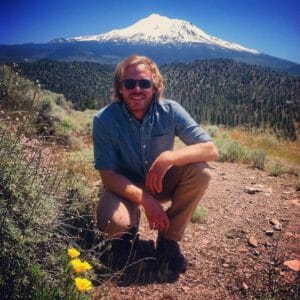
Lucas has spent his life wandering through inner and outer landscapes, collecting experiences, and sharing those experiences with those closest to him. His outer wanderings have led him to working with earth and plants around the world, including starting a biodynamic/permaculture food forest in Central Vermont. Lucas has also spent time working with people who were experiencing extreme states of consciousness while at Soteria-Vermont and while volunteering with The Zendo Project. The galleries of his inner world are made up of psychedelic musings, astrological insights, and various constellations of esoteric traditions. Lucas holds degrees in Environmental Science and Psychology and is currently pursuing an MA in Religious Studies.
Lucas can be reached through his email address at lucasjackson24@gmail.com as well as on Instagram @biodellic. He is available for astrological readings and is happy to meet others interested in discussing the topics covered throughout this episode of the podcast.
In this special interview, Joe and Kyle sit down with Theologian, John B. Cobb Jr., referred to as the Godfather of American Theology. They recorded with John at the conference they all attended in California, on how exceptional experience can help save the world. They cover a range of topics inspired from Alfred Whitehead’s teachings and the promising applications of Whitehead’s thoughts in the area of ecological civilization and environmental ethics pioneered by John Cobb Jr.
3 Key Points:
- Process thinking argues that reality consists of processes rather than material objects, and that thinking this way is similar to the teachings of a psychedelic experience. It is hoped for and believed that exceptional experiences can help save the world.
- Whitehead's process philosophy argues that there is urgency in coming to see the world as a web of interrelated processes of which we are integral parts, so that all of our choices and actions have consequences for the world around us.
- Certain curriculum, education systems and Universities are not helping us to see the value of our world. A full systems change is needed and hopefully psychedelics, exceptional experiences and process thinking can help with that.
Support the show
- Patreon
- Leave us a review on iTunes
- Share us with your friends – favorite podcast, etc
- Join our Facebook group - Psychedelics Today group – Find the others and create community.
Navigating Psychedelics
Trip Journal Integration Workbook


Show Notes
Process Thought
- Alfred North Whitehead
- The senses heighten connection, but we shouldn't rely only senses for our experiences
- The label that can we give to the 'most fundamental relationship' is any 'happening'
- What's happening when we listen to music?
- We aren't hearing one tone after another tone, we are hearing the music as a whole piece
- Whitehead calls the fundamental relationship of inclusion, a 'prehension'
- How one moment leads into another moment
- If the world is made up of prehensions, then in any given moment, what is prehended?
- The boundary between conscious and unconscious experience is fuzzy.
- Whitehead calls the relatedness to the past, physical prehensions. But we also prehend, potentialities. It is being experienced as potential not as actual.
- Whitehead thinks this is present in very elementary matters.
- Whitehead says that waves of vibration are a very large part of the world we live in
- Whitehead believes that without some type of variation from moment to moment, that nothing really happens
- He wrote a lot on relativity and very little about quantum
- David Bohm
- He was very process oriented
- He wanted to change our language into using words that mean something is ‘happening’ versus using nouns that say that something ‘is’
- “If you only have potentiality and too little grounded in actuality, you better be careful. If you don't have the potentiality, then you live in a deterministic universe” - John
“Does Whitehead relate the potentialities to his ideas about intuition?”
- Intuition can be of both pure potentials and about other people
- A lot of paranormal experiences are not supernatural
- Just because someone has seen something or done something, it doesn't mean that it's true. There is plenty of illusion.
[caption id="attachment_3637" align="alignleft" width="300"] T-shirts available on our store[/caption]
T-shirts available on our store[/caption]
Complex Societies
- An important feature of Whitehead is to distinguish complex society
- Panexperientialism is ‘the view that if evolution of humans goes all the way down to subatomic particles, then human ‘experience’ by deduction must have originated at the subatomic level, which implies that not just humans but individual cells, individual molecules, individual atoms, and even individual subatomic particles, such as photons or electrons, incorporate a capacity for ‘feeling’ or degree of subjective inferiority.'
- There might be in-deterministic qualities in individual entities
- From a Whiteheadian point of view, contemporary physics would be almost universally valid if the entire world were made up entirely of physical feelings, feelings of actual occasions, ‘what is’.
“What would be opposed to physical feelings?”
- Conceptual feelings, feelings of potentials
- He thinks there are feelings of potential in every actual occasion
- “The attempt to make standard physics apply to the quantum world are a total failure.” -John
- “The attempt to make standard physics apply to the human experience is the task of the Neuroscientists. They think that the subjective experience has a causal role to play in the world.” -John
- It's more committed to metaphysics than it is to empirical study
“Do you think what's going on in the mind, say neurotransmitters or electrical activity firing, that is creating this reality, or the experience, is having an influence on the neurochemistry?”
- John says that the psyche plays a role
- Scientists who are busy engineering genetic change, tell us purpose plays no role in genetic change
“What do you mean by no purpose in genetic change?”
- Purpose cannot have a causal effect in the Cartesian world
- They say ‘I know that my purposes are completely the result of mechanical relations between my neurons’
“Could you elaborate on the definition of actual occasions?”
- The psyche is a consistent series of actual occasions
- Its what kinds of things are in and of themselves, ‘actual’
- It's in the distinction of things that can be divided up into other entities
- An actual occasion cannot be divisible into other actual occasions
- Like an atom, it is divisible, but dividing it does not keep it from actually existing
- For Whitehead, an actual occasion is the basic unit of actuality
- Its an alternative to a ‘substance’ way of viewing
- When we look at other living beings, animals with brains and such, we assume they have a psychic life
- John thinks that plants have some kind of unified experience
- Some people have a feeling about a tree, that it's not just a bunch of cells interacting
- “It's hard for me to think that a stone is an experiencing entity, I think the molecules though are.” - John
- “I’m sure that cells are influenced by the emotions of people” -John
- Having a particular conceptuality does not define how things are going to map out
“This world view seems very psychedelic.”
- Among quantum physicists, Whitehead’s name is known and appreciated.
- It may mean that physics as a whole might adopt an organic model than just mechanistic one
- The common sense in this is that our knowledge of each other is not just in visual and auditory clues, but people have been told so long that it is
“What else would it be informed by if not by visual and auditory cues?”
- Just by our immediate experience of each other
- If you go into a room, there is an immediate climate there. You can tell when you walk into a room full of angry people.
- Ivan Illich's Book on Deschooling Society (Open Forum S)
“What would be your vision of an education system if its not working right now?”
- The one that Matthew Segal teaches in CIIS are examples of a different education system
- The Great Books program needs revision. It's only been the great western books. John hopes they have incorporated great books from other parts of the world
- There are parts of different educational systems that are better than what we have
- “If I had an opportunity to create a school, it would be a school that teaches ecological civilization because a healthy human survival is a goal that ought not to be regarded as an eccentric and marginal one, but regarded as what all we human beings ought to be getting behind collectively, together. And if you have a school for that, the curriculum would be quite varied, but the production and consumption and sharing of food should be a very central part of it.” -John
- Capitalism has ignored much of reality
- John says creating a curriculum is not his role, his role is deconstruction because he thinks what is going on now is absurd
- “Enlightenment is the worst curse of humanity, we have been enlightened into not believing all kinds of things. The disappearance of subject from the world of actuality. If that's enlightenment, then I don't want to be enlightened.” - John
Language
- John thinks we need a lot of reflection on the language we use
- The questions that are the most important are the ones rarely asked
- “One of my favorite parts of Whitehead is the reframing of language, our words carry inertia that we are not aware of” - Joe
- Whitehead Word Book: A Glossary with Alphabetical Index to Technical Terms in Process and Reality (Toward Ecological Civilzation) (Volume 8)
- The reason there are 36 universities for process studies and 0 in the United States, is because in the US, process isn't as fundamental as substance
Kyle Shares his Near Death Experience
- Kyle got in a snowboarding accident, ruptured his spleen and lost about 5 pints of blood
- It became mystical when he was in the MRI machine and he was standing on one side of the room with the doctors and in his body at the same time
- There was an orb of light, and an external voice or ‘experience’ that said “you're going home, back to the stars where you came from, this is just a transition, the more you relax into it, the easier it will be.”
- Kyle describes it as a blissful experience, but he had a hard time integrating it back into his life.
- Whitehead has done a remarkable job to describe process, and exceptional experience and putting a language to it
- Joe says that Whitehead’s work has helped put the psychedelic experience into words
“Do you recall the first time you heard something that made you interested in the impact of psychedelics?”
- Lenny Gibson was probably one of the first people that opened his eyes to the positive uses
- “Today, it would be remarkable if 10% of the world's population survived without civilization” -John
- He is confident that there are good things that come from psychedelics
- He says Whitehead has made him understand the changes that might make us behave in responsible ways, so he doesn't feel the necessity of having a psychedelic experiences
“What kind of changes?”
- We have to change from our substance thinking to process thinking
- We need to shift from thinking that every individual is self-contained, we are all products of our relationships with each other.
- In the Whiteheadian view, any individual is, the many becoming one. To be an individual is being a part of everything.
Links
Website
Process Theology: An Introductory Exposition
Other books by John Cobb Jr.
A Christian Natural Theology, Second Edition: Based on the Thought of Alfred North Whitehead
Jesus' Abba: The God Who Has Not Failed
Grace & Responsibility: A Wesleyan Theology for Today
For Our Common Home: Process-Relational Responses to Laudato Si'
About John B. Cobb Jr.
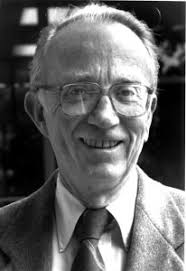
John B. Cobb, Jr., Ph.D, is a founding co-director of the Center for Process Studies and Process & Faith. He has held many positions, such as Ingraham Professor of Theology at the School of Theology at Claremont, Avery Professor at the Claremont Graduate School, Fullbright Professor at the University of Mainz, Visiting Professor at Vanderbilt, Harvard Divinity, Chicago Divinity Schools. His writings include: Christ in a Pluralistic Age; God and the World; For the Common Good. Co-winner of Grawemeyer Award of Ideas Improving World Order.
In this episode, Joe gets on the mic to chat about some current events in the psychedelic space such as the recent passing of psychedelic icon Ralph Metzner, the Psilocybin decriminalization initiatives in Denver and now Oakland, and psychedelic use in the Military.
3 Key Points:
- Psychedelic Icon, Ralph Metzner passed away on March 14th, 2019. He had a remarkable career and published a ton of books around psychedelics in his time.
- A recent study found that a single dose of Psilocybin can enhance creative thinking and empathy for up to 7 days after use.
- Activists are planning an initiative to decriminalize Psilocybin in Oakland. Denver will vote on decriminalization on the May 7th ballot.
Support the show
- Patreon
- Leave us a review on iTunes
- Share us with your friends – favorite podcast, etc
- Join our Facebook group - Psychedelics Today group – Find the others and create community.
Get Educated
Navigating Psychedelics: 5-Week Live Online Course
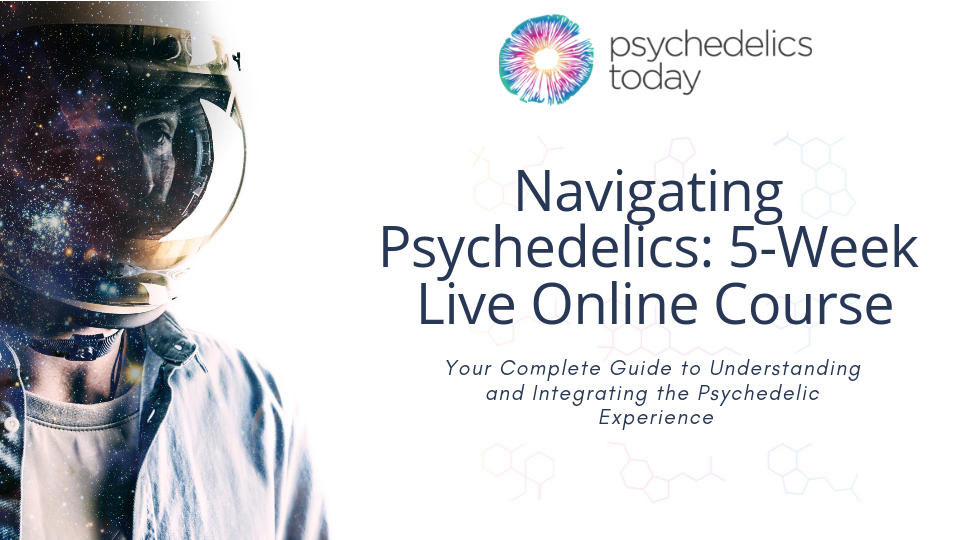
Trip Journal Integration Workbook


Show Notes
Ralph Metzner
- Ralph Metzner passed away on March 14th, 2019
- He was a part of the Leary, Alpert trio
- Ralph was a psychologist, writer and researcher who participated in psychedelic research in the 60’s.
- He had a remarkable career and published a ton of books:
- The Psychedelic Experience: A Manual Based on the Tibetan Book of the Dead
- Maps of consciousness;: I Ching, tantra, tarot, alchemy, astrology, actualism
- The Unfolding Self: Varieties of Transformative Experience
- Green Psychology: Transforming Our Relationship to the Earth
- Sacred Mushroom of Visions: Teonanácatl: A Sourcebook on the Psilocybin Mushroom
- Sacred Vine of Spirits: Ayahuasca
- The Expansion of Consciousness (Ecology of Consciousness)
- Alchemical Divination: Accessing your spiritual intelligence for healing and guidance (The Ecology of Consciousness)
- Ecology of Consciousness: The Alchemy of Personal, Collective, and Planetary Transformation
- Overtones and Undercurrents: Spirituality, Reincarnation, and Ancestor Influence in Entheogenic Psychotherapy
- Searching for the Philosophers’ Stone: Encounters with Mystics, Scientists, and Healers
- The Toad and the Jaguar a Field Report of Underground Research on a Visionary Medicine: Bufo Alvarius and 5-Methoxy-Dimethyltryptamine
- The Psychedelic Experience: A Manual Based on the Tibetan Book of the Dead
Psilocybin and Creativity
- A single dose of Psilocybin enhances creative thinking and empathy for up to 7 days after use
- It was a 55 participant study in the Netherlands
Decriminalize Psilocybin in Oakland
- Activists plan to decriminalize Psilocybin in Oakland
Decriminalize Psilocybin in Denver
- It will be voted on, on May 7th
- Joe believes all drugs should be decriminalized
- We need to have a compassionate drug policy
- Placing people in jail for non-violent offences tears apart families
- We should not favor one drug over another in terms of decriminalization
Use of Psychedelics to do War More Effectively
Harm Reduction
- Joe mentions conversation he had with a friend of the show
- He mentioned that Ayahuasca sometimes has mold on it
- Ayahuasca is labor intensive to make, so they make it once and then it grows mold
- Then people come and drink the mold infested Aya and it can make a person more sick than they need to be
- “If you have the option to be more safe, should you be?”
- If we have less harm and less deaths in the drug world over time, in the next 5 or 6 years we are going to see huge benefits with these substances
- Staying out of jail, not dying, and by being safer with drugs we have more of a chance to influence policy and make these substances and drug checking more available for the future culture
About Joe
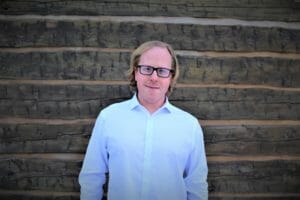
Joe studied philosophy in New Hampshire, where he earned his B.A.. After stumbling upon the work of Stanislav Grof during his undergraduate years, Joe began participating in Holotropic Breathwork workshops in Vermont in 2003. Joe helped facilitate Holotropic and Transpersonal Breathwork workshops while he spent his time in New England. He is now working in the software industry as well as hosting a few podcasts. Joe now coordinates Dreamshadow Transpersonal Breathwork workshops, in Breckenridge, Colorado.
In this episode Kyle and Joe sit down and discuss Esketamine, a new FDA approved drug that is a derivative of Ketamine. They invite quotes from professionals who have experience with generic Ketamine and to voice their opinions.
3 Key Points:
- Janssen Pharmaceutica has announced an FDA approved derivative of Ketamine, Esketamine, called Spravato.
- The new drug is facing critique on its pricing, route of administration as well as functional differences when compared to the traditional, generic Ketamine.
- Joe and Kyle invite professionals in the field who have experience with generic Ketamine to voice their opinions, hopes and concerns about Spravato.
Support the show
- Patreon
- Leave us a review on iTunes
- Share us with your friends – favorite podcast, etc
- Join our Facebook group - Psychedelics Today group – Find the others and create community.
Navigating Psychedelics
Trip Journal Integration Workbook


Show Notes
Esketamine
- Janssen Pharmaceutica, a Johnson & Johnson Subsidiary has created a derivative of Ketamine called Esketamine and has gone through the whole FDA approval process
- There has been some concern about a big pharmaceutical company, Janssen coming in and creating a ‘new molecule’ and introducing an FDA approved ‘psychedelic’ to make generic Ketamine obsolete
Pricing
- There is going to be price differences based on routes of administration (Intravenous vs lozenges)
- $1.59 at 100 milligrams (93% bioavailable when administered IM)
- The list price of Esketamine through Janssen will be $590-$885 per treatment session based on the dosage taken which will vary between patients
- During the first month of therapy, that would add up to $4720-$6785
After the first month, maintenance therapy could range from $2300-$3500 - Joe says Ketamine should be cheap
- During the first month of therapy, that would add up to $4720-$6785
Scott Shannon
- Scott Shannon, Director of the Wholeness Center
- Joe reads a quote from Scott that says that the new Janssen Esketamine product is overpriced, the research data showed that only 2 out of 5 studies demonstrated effectiveness, and generic Ketamine is much more effective and cheaper than Esketamine
Insurance
- Insurance might cover Esketamine
- Kyle says he hasn't heard of too many generic Ketamine sessions being covered by Insurance
Jessica Katzman
- The approval of Esketamine by the FDA is controversial based on the route of administration, cost and functional differences
- Only 8-50% of the Esketamine dose is effective
- Some of the benefits of Esketamine are it's legitimizing of the existing generic
- Ketamine use as well as an Insurance overview of Ketamine and Esketamine via cost analysis
- Esketamine is not new, it has been around for a long time
Dr. Matt Brown
- Physicians have been able to provide Ketamine for decades
- Janssen was able to get the FDA to approve literally half of what generic Ketamine is
- There are a lot of unknowns for Esketamine yet, it hasn't even hit the shelves yet
- Kyle says Ketamine has been used to bring patients internally, like most psychedelic sessions
- Kyle also says Ketamine is more dissociating, where classic tryptamines like psilocybin are more activating
Contraindications
- Hypertension, stroke, intracranial mass/hemorrhage and cautions like pregnancy, substance abuse, etc.
- It's pretty available in the underground, so it could have the potential for risk of abuse
- Recreational experiences have the opportunity to be the most therapeutic and eye-opening experience
- Audiobook - Function of Reason by Alfred North Whitehead
- "I need not continue the discussion. The case is too clear for elaboration. Yet the trained body of physiologists under the influence of the ideas germane to their successful methodology entirely ignore the whole mass of adverse evidence. We have here a colossal example of anti-empirical dogmatism arising from a successful methodology. Evidence which lies outside the method simply does not count.
We are, of course, reminded that the neglect of this evidence arises from the fact that it lies outside the scope of the methodology of the science. That method consists in tracing the persistence of the physical and chemical principles throughout physiological operations." - quote from Function of Reason
- "I need not continue the discussion. The case is too clear for elaboration. Yet the trained body of physiologists under the influence of the ideas germane to their successful methodology entirely ignore the whole mass of adverse evidence. We have here a colossal example of anti-empirical dogmatism arising from a successful methodology. Evidence which lies outside the method simply does not count.
Opinions
- Joe invites listeners to ask questions and leave a message of opinions and such (either anonymously or using your name)
- Google voice 970-368-3133
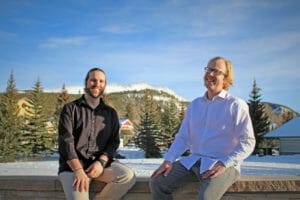
About Kyle
Kyle’s interest in exploring non-ordinary states of consciousness began when he was 16-years-old when he suffered a traumatic snowboarding accident. Waking up after having a near-death experience changed Kyle’s life. Since then, Kyle has earned his B.A. in Transpersonal Psychology, where he studied the healing potential of non-ordinary states of consciousness by exploring shamanism, plant medicine, Holotropic Breathwork, and the roots/benefits of psychedelic psychotherapy. Kyle has co-taught two college-level courses. One of the courses Kyle created as a capstone project, “Stanislav Grof’s Psychology of Extraordinary Experiences,” and the other one which he co-created, “The History of Psychedelics.”
Kyle is currently pursuing his M.S. in clinical mental health counseling with an emphasis in somatic psychology. Kyle’s clinical background in mental health consists of working with at-risk teenagers in crisis and with individuals experiencing an early-episode of psychosis. Kyle also facilitates Transpersonal Breathwork workshops.
About Joe
Joe studied philosophy in New Hampshire, where he earned his B.A.. After stumbling upon the work of Stanislav Grof during his undergraduate years, Joe began participating in Holotropic Breathwork workshops in Vermont in 2003. Joe helped facilitate Holotropic and Transpersonal Breathwork workshops while he spent his time in New England. He is now working in the software industry as well as hosting a few podcasts. Joe now coordinates Dreamshadow Transpersonal Breathwork workshops, in Breckenridge, Colorado.

